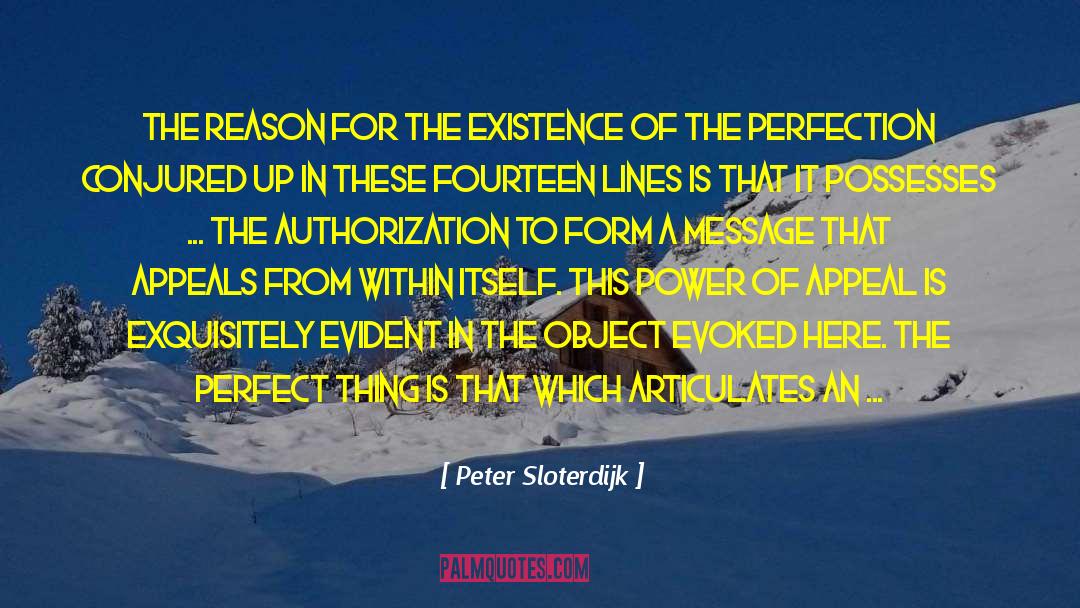Peter Sloterdijk Famous Quotes
Reading Peter Sloterdijk quotes, download and share images of famous quotes by Peter Sloterdijk. Righ click to see or save pictures of Peter Sloterdijk quotes that you can use as your wallpaper for free.
As the activity culture of modernity constitutes itself against heteronomy, however, it will seek and find methods to place the commanding authority inside the hearer of the command themselves, so that they seem only to be obeying their inner voice when they submit. In this way, the fact of 'subjectivity' is demanded, created and fulfilled. What is meant, then, is the individual's co-determination of the authority that can give them commands.
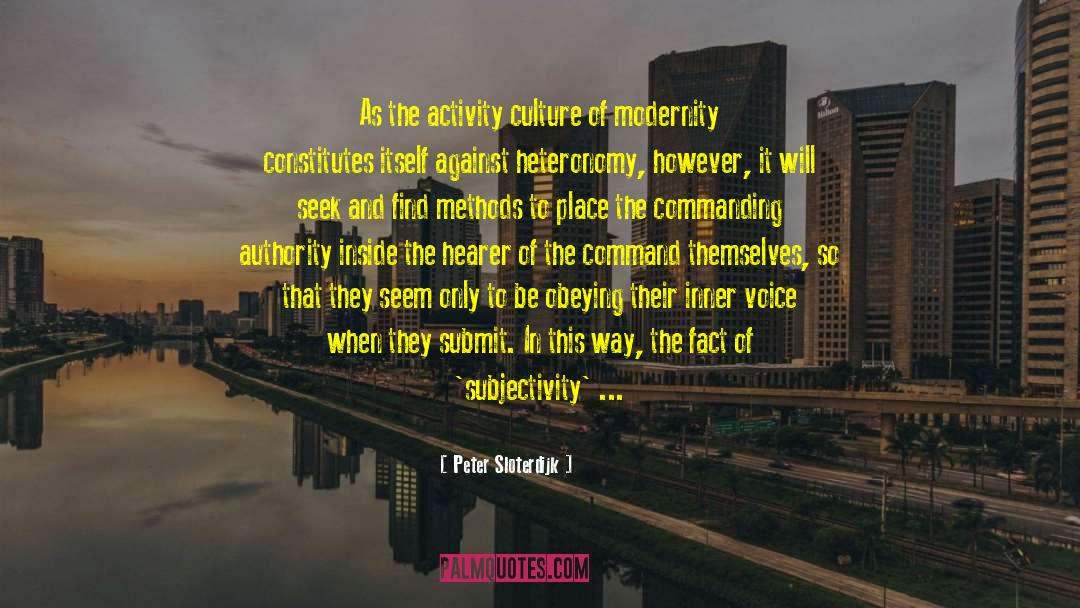
The extension of the moral-historical perspective makes the meaning of the thesis of the athletic and somatic renaissance apparent. At the transition from the nineteenth to the twentieth century, the phenomenon labelled the 'rebirth of antiquity' in the language regulations of art history entered a phase that fundamentally modified the motives of our identification with cultural relics from antiquity, even from the early classical period. Here, as we have seen, one finds a regression to a time in which the changing of life had not yet fallen under the command of life-denying asceticisms. This 'supra-epochal' time could just as easily be called the future, and what seems like a regression towards it could also be conceived of as a leap forwards.
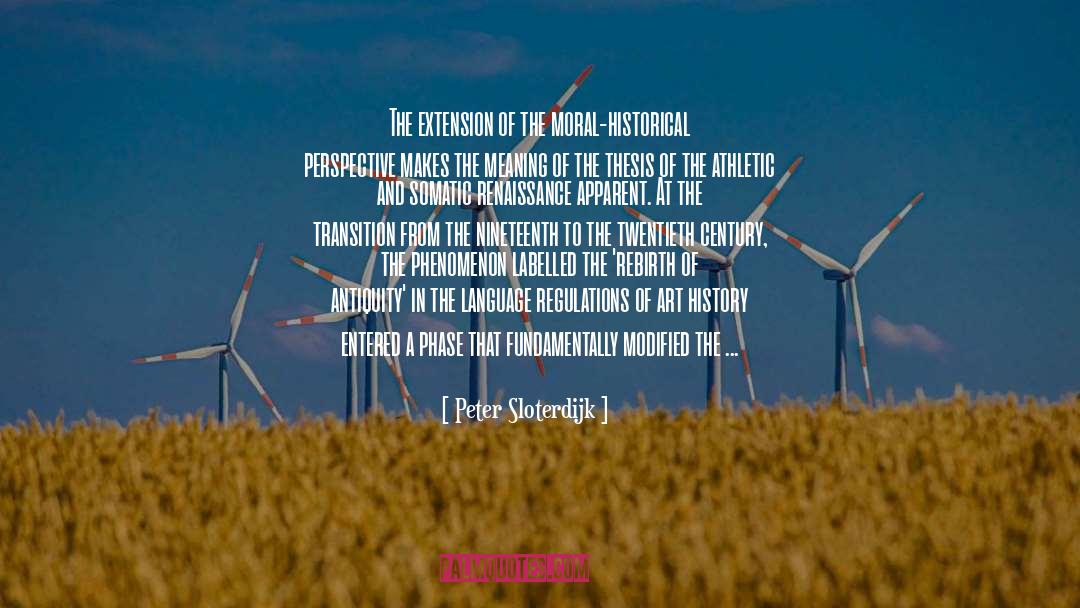
Above all: only grant the suspicion that sport is a pastime for the most stupid as much space as it deserves, do not misuse it as a pretext to drift further in your customary state of self-neglect, distrust the philistine in yourself who thinks you are just fine as you are! Hear the voice from the stone, do not resist the call to get in shape! Seize the chance to train with a god!
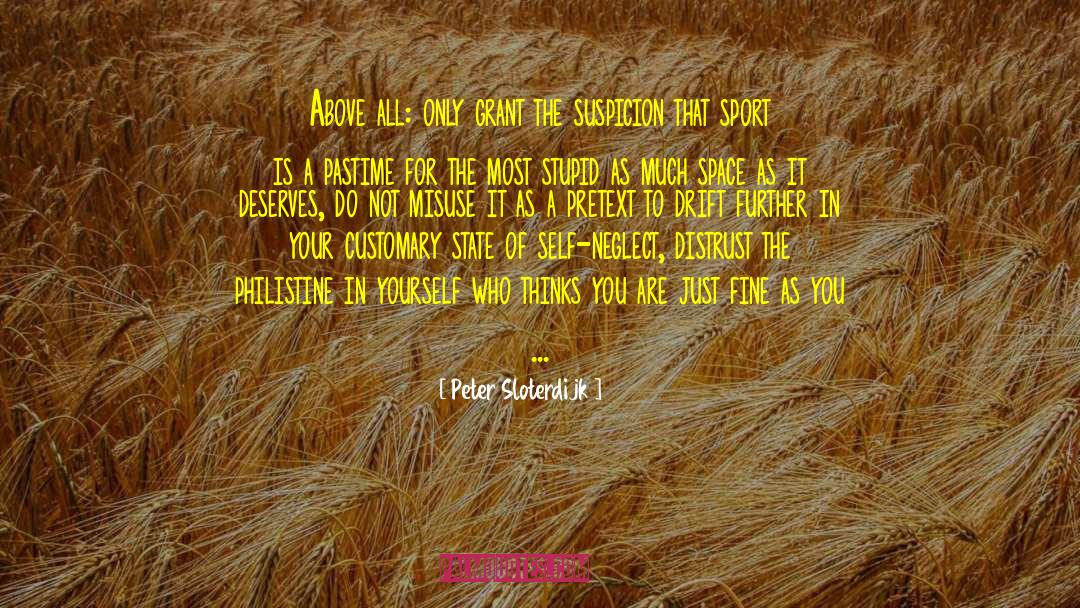
In the wall-less house of sounds, humans became the animals that come together by listening. Whatever else they might be, they are sonospheric communards.
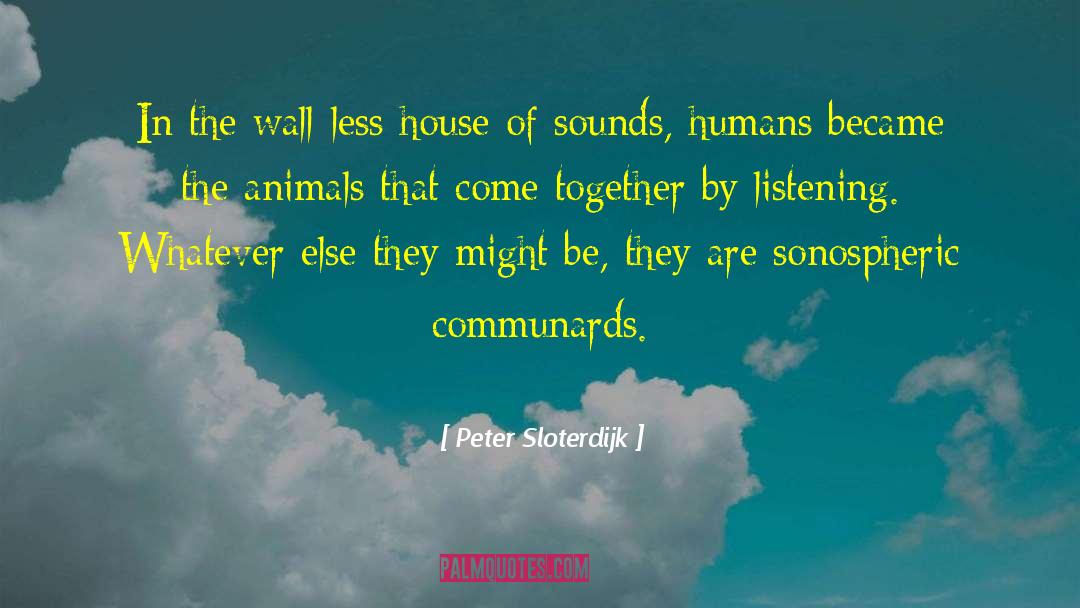
For many intelligences,the thought of homely intimacies is associated with a spontaneous disgust at too much sweetness-which is why there is neither a philosophy of sweetness nor an elaborated ontology of the intimate. One must assess the nature of this resistance if one is to get past typical initial aversions. From a distance,the subject appears so unattractive and inconsequential that for the time being,only suckers for harmony or theophilic eunuchs would get stuck on it. An intellect that spends its energy on worthy objects usually prefers the sharp to the sweet; one does not offer candy to heroes
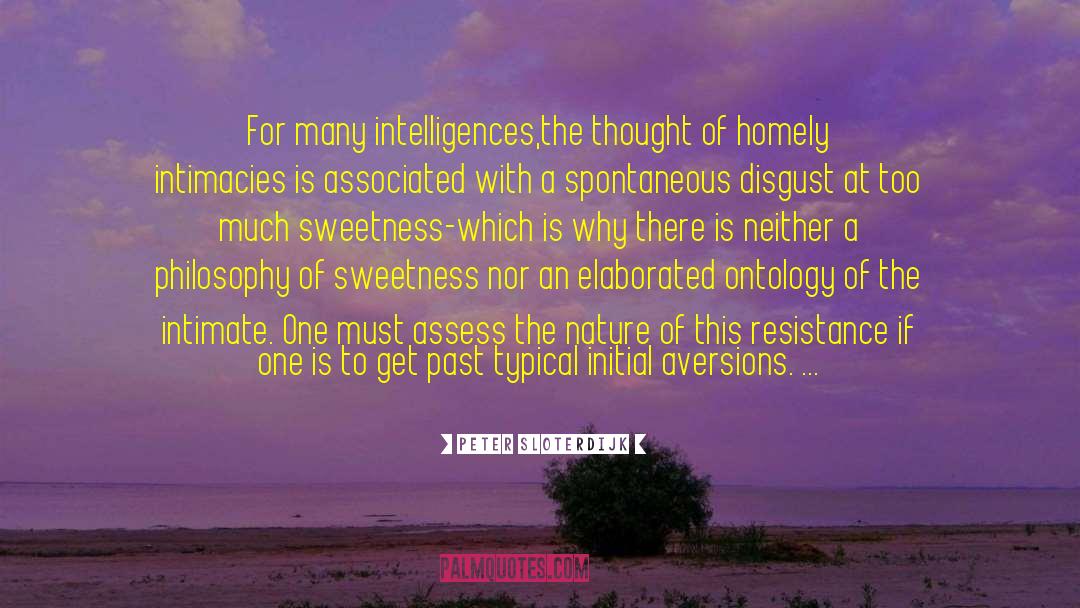
Only very few - only humans, as far as we know - achieve the second level of transcendent movement. Through this, the environment is de-restricted to become the world as an integral whole of manifest and latent elements. The second step is the work of language. This not only builds the 'house of being' - Heidegger took this phrase from Zarathustra's animals, which inform the convalescent: 'the house of being rebuilds itself eternally'; it is also the vehicle for the tendencies to run away from that house with which, by means of its inner surpluses, humans move towards the open. It need hardly be explained why the oldest parasite in the world, the world above, only appears with the second transcendence.
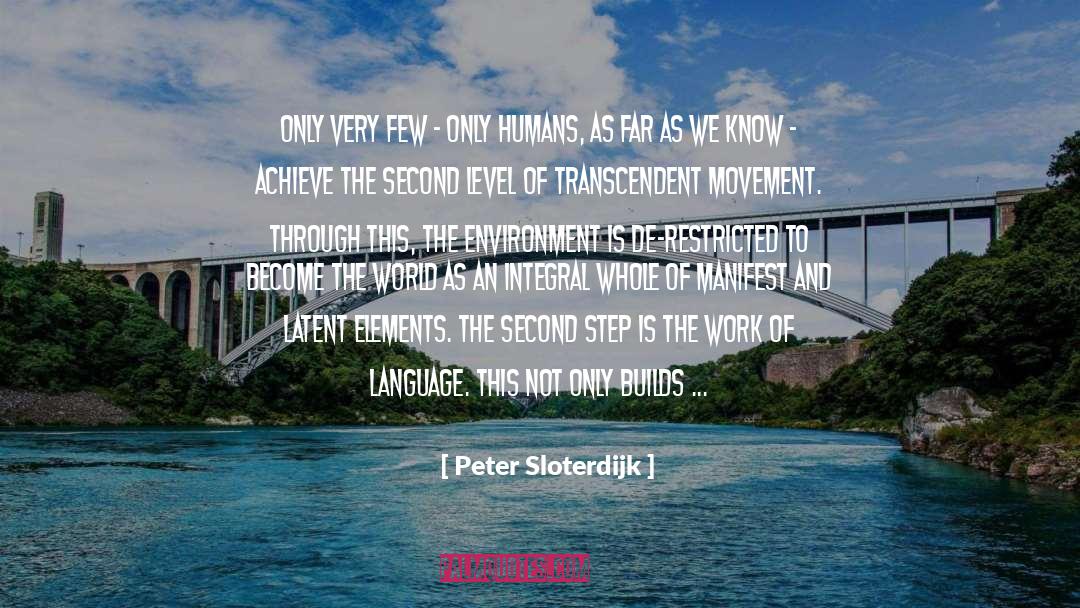
It is not only the weary Homo faber, who objectifies the world in the 'doing' mode, who must vacate his place on the logical stage; the time has also come for Homo religiosus, who turns to the world above in surreal rites, to bid a deserved farewell. Together, workers and believers come into a new category. It is time to reveal humans as the beings who result from repetition. Just as the nineteenth century stood cognitively under the sign of production and the twentieth under that of reflexivity, the future should present itself under the sign of the exercise.
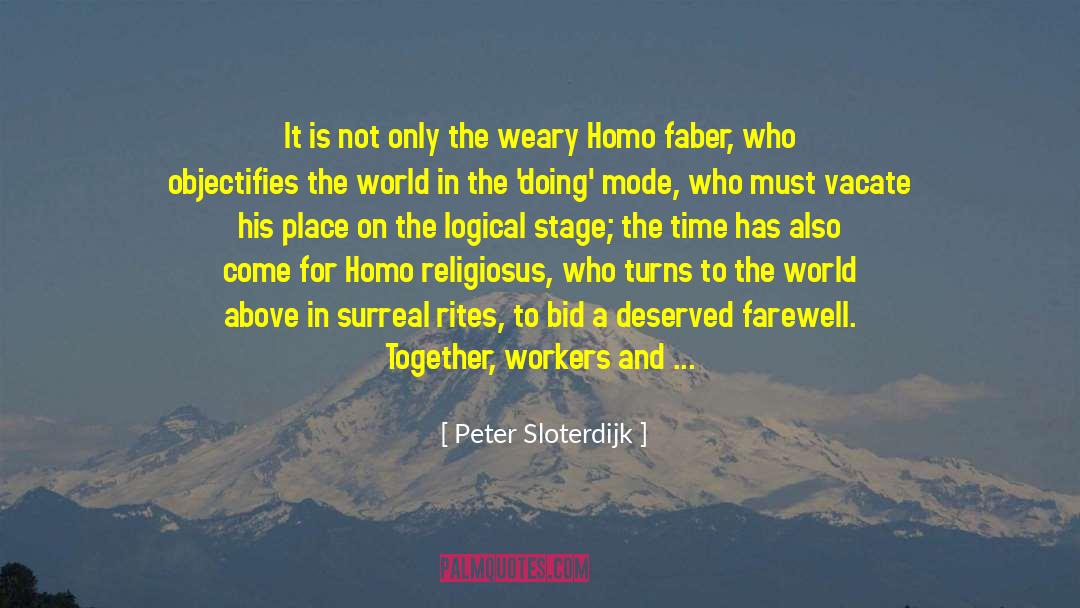
The constant back and forth between the poles of the android id and the human ego gave rise to the soul drama of the mid-Modern Age, which was simultaneously a technical drama. Its topic is best summarized in a theory of convergence, where the android moves towards its animation while increasing parts of real human existence are demystified as higher forms of mechanics. The uncanny (which Freud knew something about) and the disappointing (on which he chose to remain silent) move towards each other. The ensoulment of the machine is strictly proportional to the desoulment of humans.
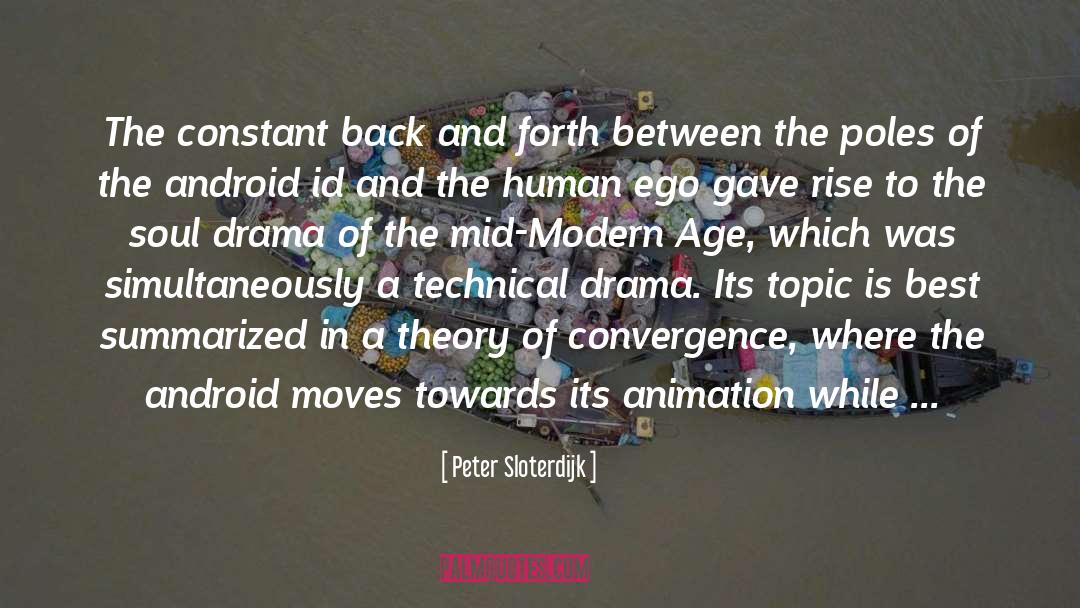
As the following pages deal with the practising life, they lead - in accordance with their topic - to an expedition into the little-explored universe of human vertical tensions. The Platonic Socrates had opened up the phenomenon for occidental culture when he stated expressis verbis that man is a being potentially 'superior to himself'. I translate this remark into the observation that all 'cultures', 'subcultures' or 'scenes' are based on central distinctions by which the field of human behavioural possibilities is subdivided into polarized classes. Thus the ascetic 'cultures' know the central distinction of complete versus incomplete, the religious 'cultures' that of sacred versus profane, the aristocratic 'cultures' that of noble versus common, the military 'cultures' that of brave versus cowardly, the political 'cultures' that of powerful versus powerless, the administrative 'cultures' that of superior versus subordinate, the athletic 'cultures' that of excellence versus mediocrity, the economic 'cultures' that of wealth versus lack, the cognitive 'cultures' that of knowledge versus ignorance, and the sapiental 'cultures' that of illumination versus blindness. What all these differentiations have in common is the espousal of the first value, which is considered the attractor in the respective field, while the second pole consistently functions as a factor of repulsion or object of avoidance.
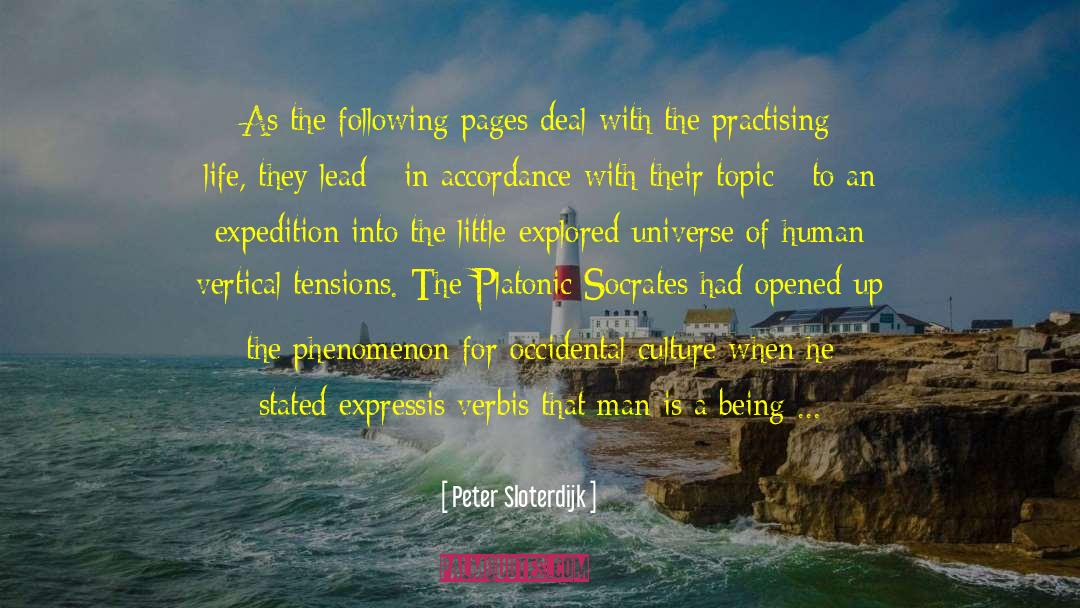
Vitality, understood both somatically and mentally, is itself the medium that contains a gradient between more and less. It therefore contains the vertical component that guides ascents within itself, and has no need of additional external or metaphysical attractors. That God is supposedly dead is irrelevant in this context. With or without God, each person will only get as far as their form carries them.
Naturally 'God', during the time of his effective cultural representation, was the most convincing attractor for those forms of life and practice which strove 'towards Him' - and this towards-Him was identical to 'upwards'. Nietzsche's concern to preserve vertical tension after the death of God proves how seriously he took his task as the 'last metaphysician', without overlooking the comical aspect of his mission. He had found his great role as a witness to the vertical dimension without God.
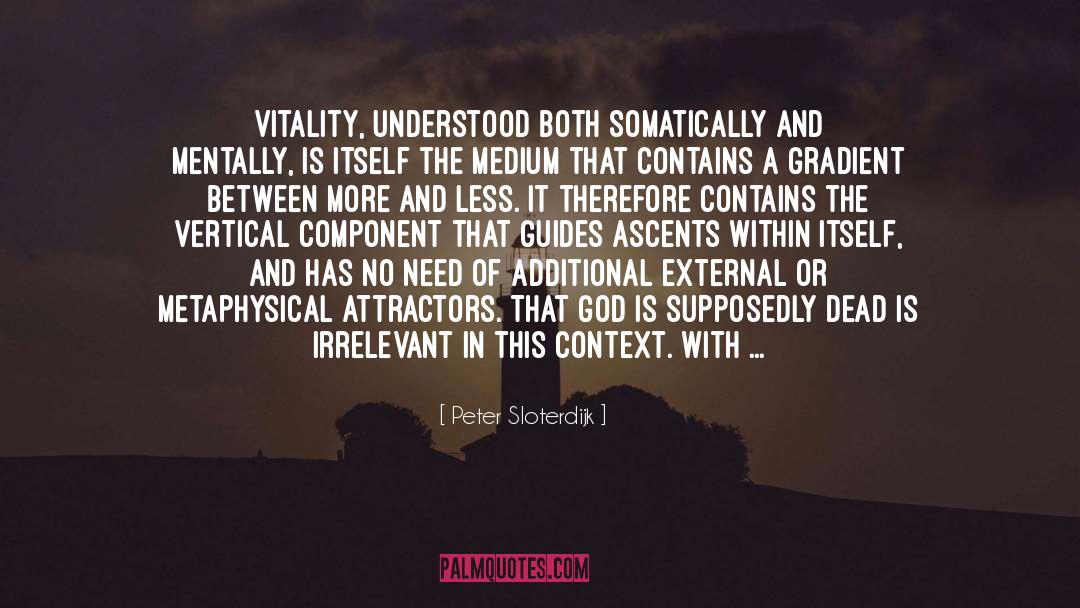
In Nietzsche's usage, the word 'Christianity' does not even refer primarily to the religion; using it like a code word, he is thinking more of a particular religio-metaphysically influenced disposition, an ascetically (in the penitent and self-denying sense) defined attitude to the world, an unfortunate form of life deferral, focus on the hereafter and quarrel with secular facts
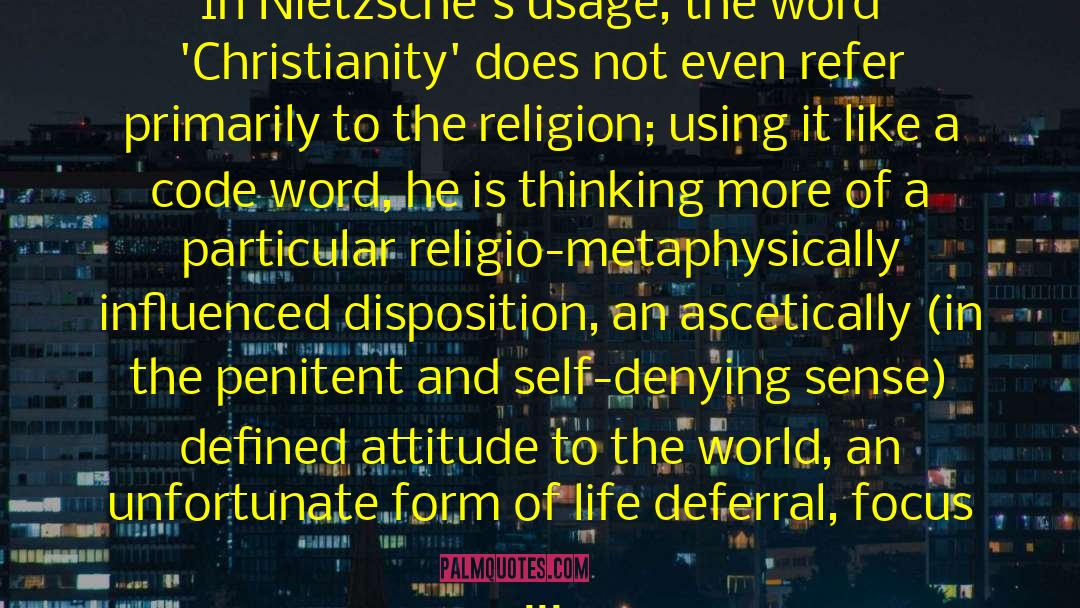
Consequently, immune systems at this level can be defined a priori as embodied expectations of injury and the corresponding programmes of protection and repair.
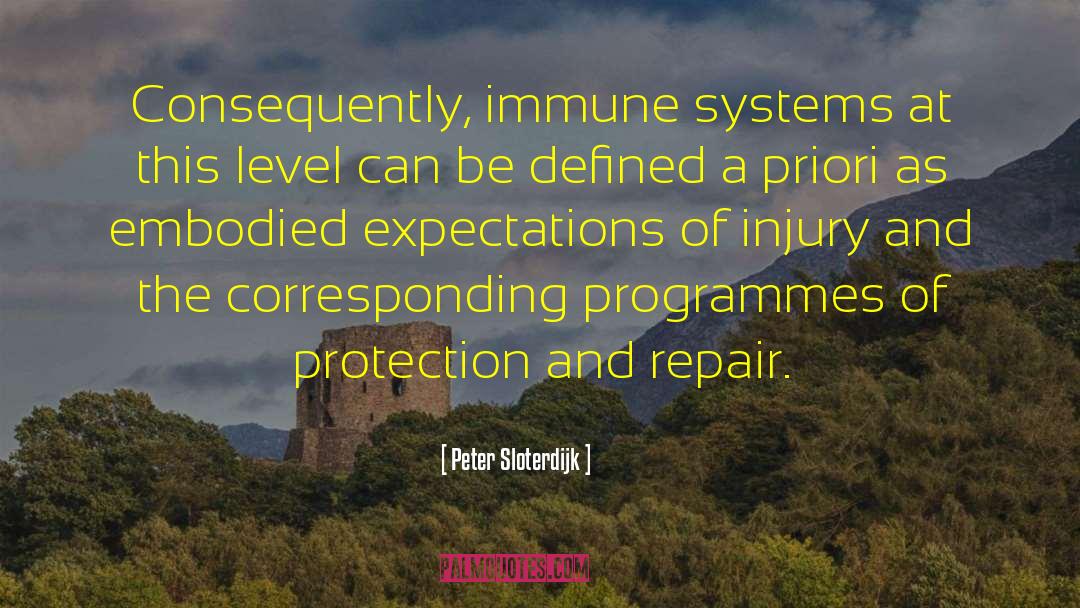
Only the artistic will to transform the future into a space of unlimited art-elevating chances enables us to understand the core of the procreation rule: 'a creator shall you create [...] a self-propelling wheel, a first movement'. This rule contains no less than Nietzsche's theology after the death of God: there will continue to be a God and gods, but only humanity-immanent ones, and only to the extent that there are creators who follow on from what has been achieved in order to go higher, faster and further.
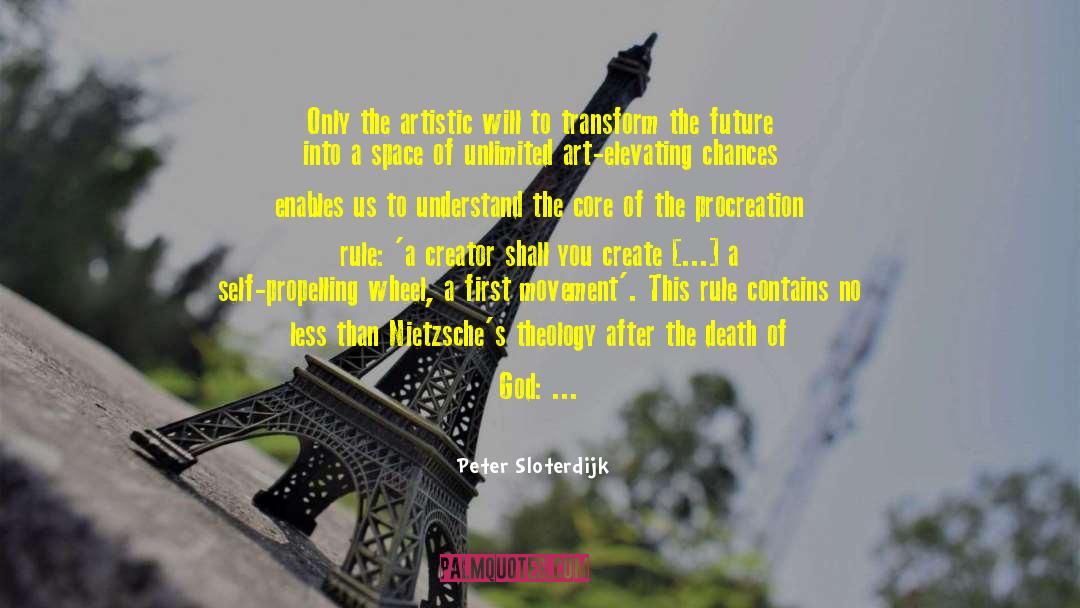
Repetition plus translation plus generalization results, with the correct calculation, in clarification. If there is such a thing as 'progress in religion', it can only manifest itself as increasing explicitness.
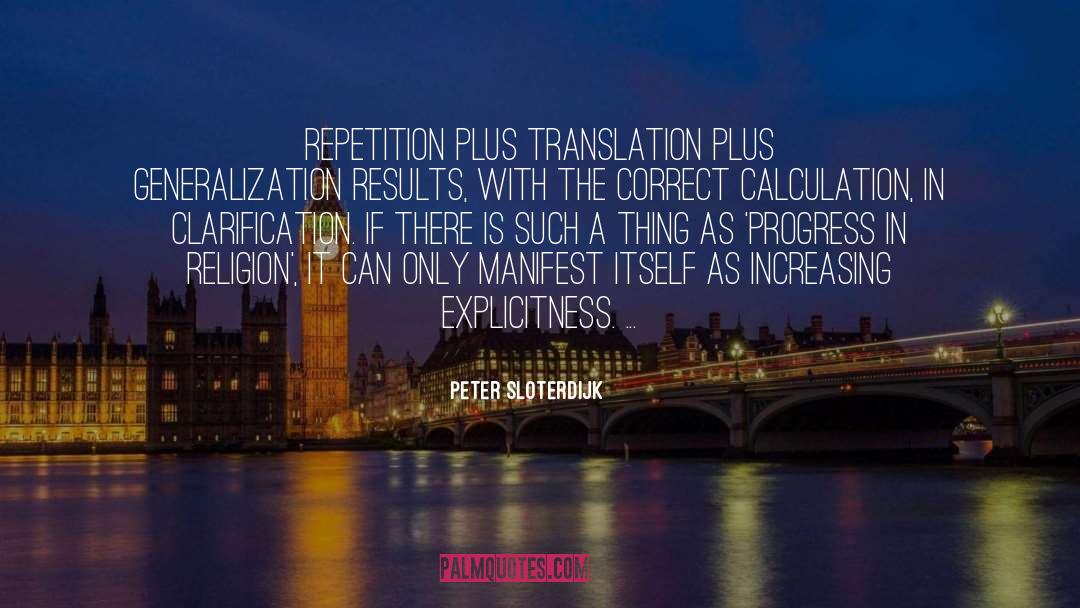
The violent, antirationalistic impulse in Western countries is reacting to an intellectual state of affairs in which all thinking has become strategy; this impulse shows a disgust for a certain form of self-preservation. It is a sensitive shivering from the cold breath of a reality where knowledge is power and power is knowledge
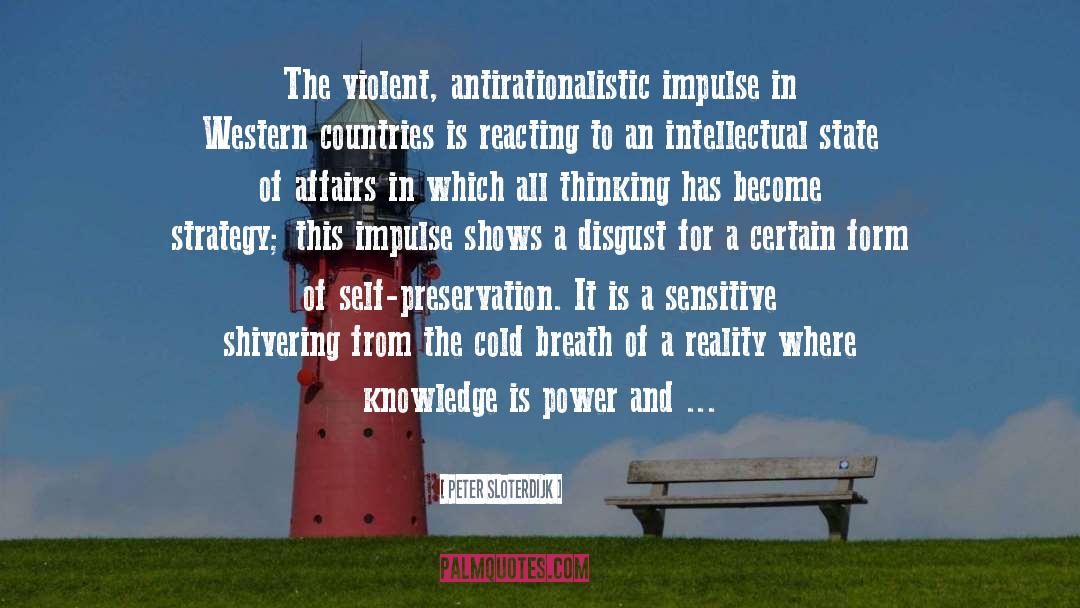
The ascetic planet he sights is the planet of the practising as a whole, the planet of advanced-civilized humans, the planet of those who have begun to give their existence forms and contents under vertical tensions in countless programmes of effort, some more and some less strictly coded. When Nietzsche speaks of the ascetic planet, it is not because he would rather have been born on a more relaxed star. His antiquity-instinct tells him that every heavenly body worth inhabiting must - correctly understood - be an ascetic planet inhabited by the practising, the aspiring and the virtuosos. What is antiquity for him but the code word for the age in which humans had to become strong enough for a sacred-imperial image of the whole? Inherent in the great worldviews of antiquity was the intention of showing mortals how they could live in harmony with the 'universe', even and especially when that whole showed them its baffling side, its lack of consideration for individuals.
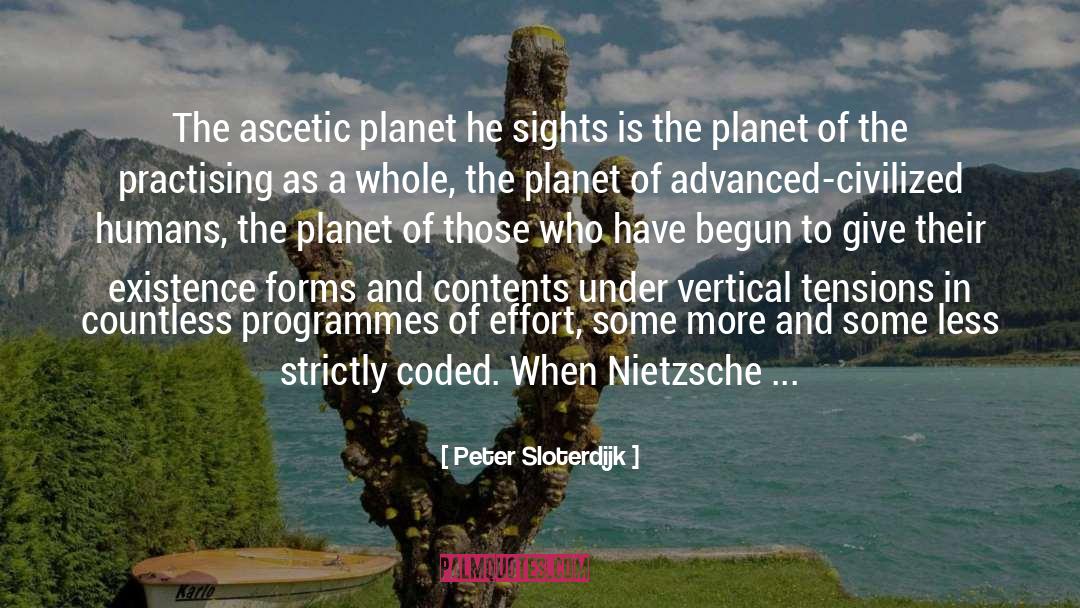
In this book, we will naturally be dealing primarily with the manifestations of the third level of immunity. I gather material on the biography of Homo immunologicus, guided by the assumption that this is where to find the stuff from which the forms of anthropotechnics are made. By this I mean the methods of mental and physical practising by which humans from the most diverse cultures have attempted to optimize their cosmic and immunological status in the face of vague risks of living and acute certainties of death. Only when these procedures have been grasped in a broad tableau of human 'work on oneself' can we evaluate the newest experiments in genetic engineering, to which, in the current debate, many have reduced the term 'anthropotechnics', reintroduced in 1997.
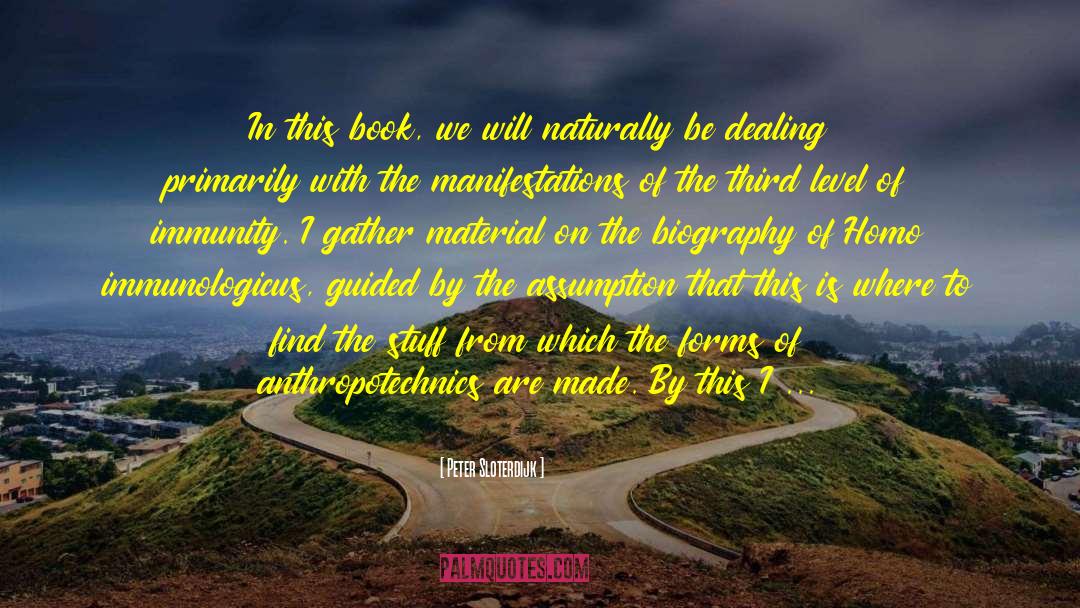
In the midst of the ubiquitous dealings with prostituted signs, the thing-poem was capable of opening up the prospect of returning to credible experiences of meaning. It did this by tying language to the gold standard of what things themselves communicate. Where randomness is disabled, authority should shine forth.
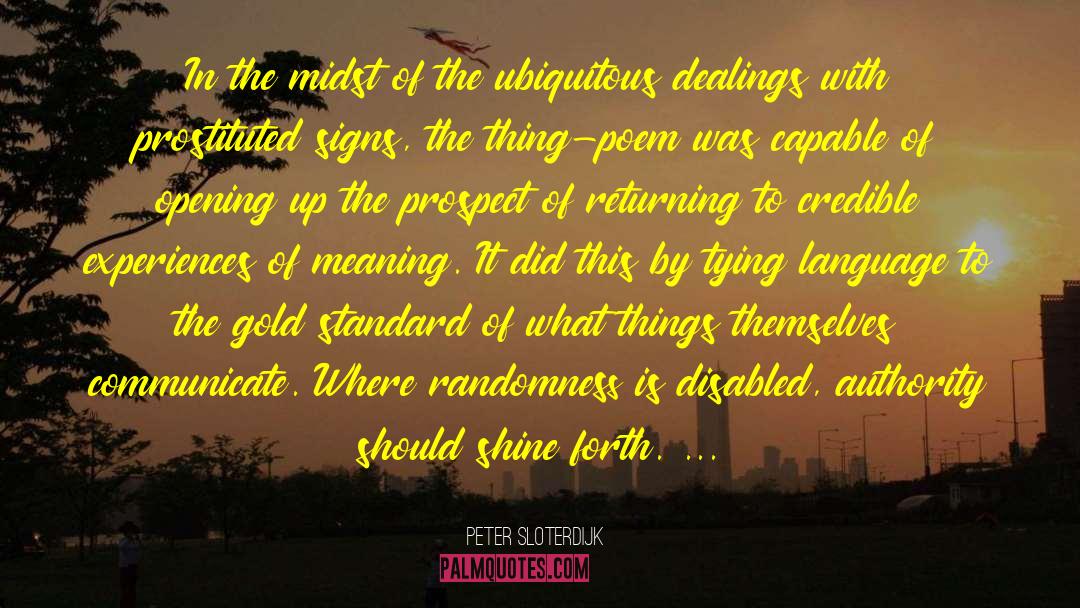
We are in an outside that carries inner worlds.
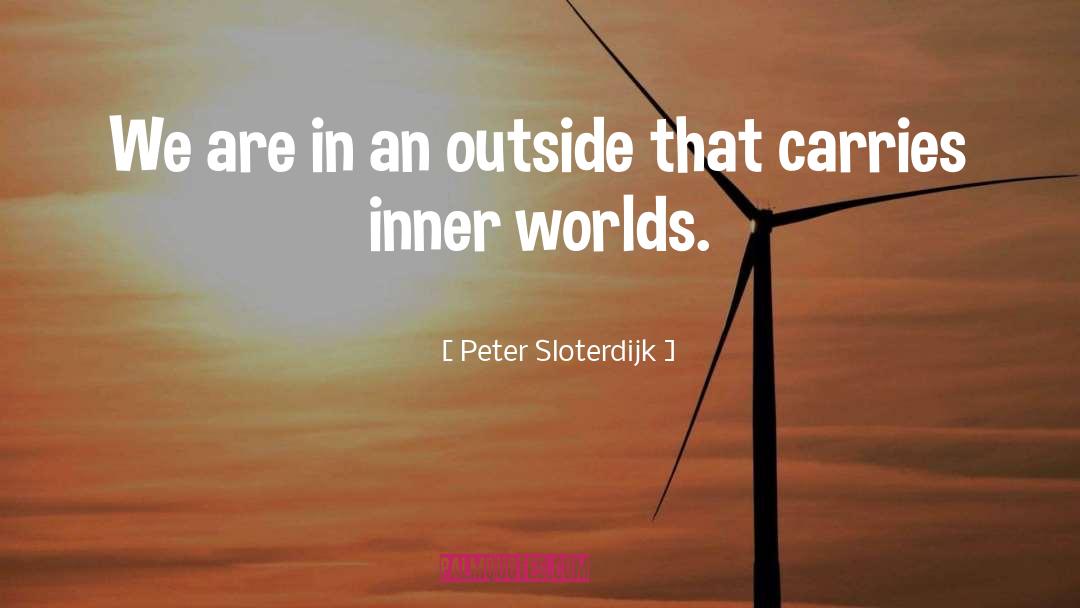
But if man genuinely produces man, it is precisely not through work and it's concrete results, not even the 'work on oneself' so widely praised in recent times, let alone through the alternatively invoked phenomena of 'interaction' or 'communication': it is through life in forms of practice. Practice is defined here as any operation that provides or improves the actor's qualification for the next performance of the same operation, whether it is declared as practice or not.
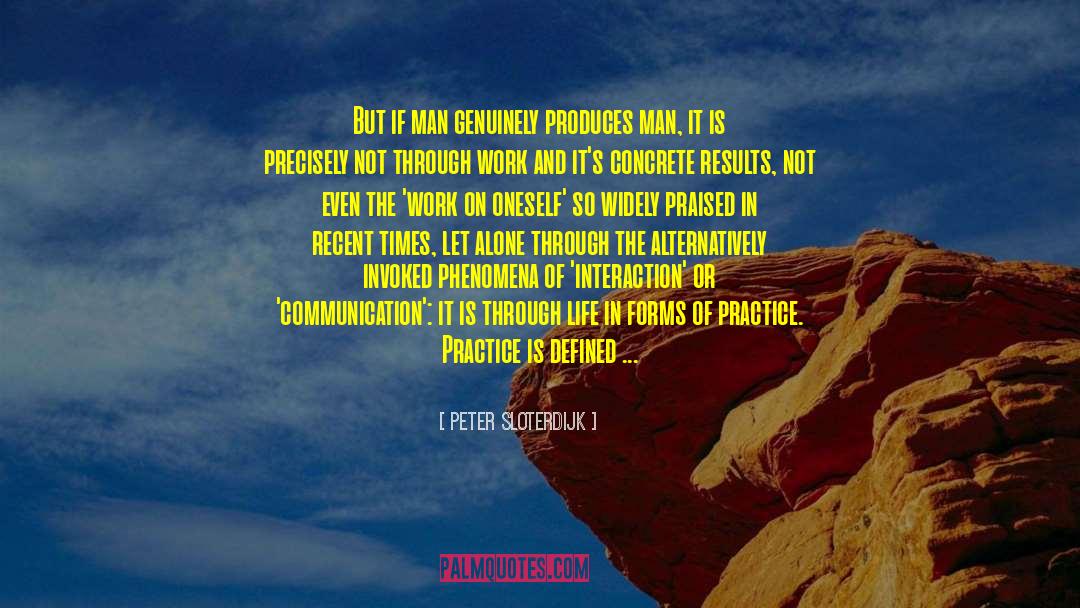
The human being does not hop out of the magician's hat in the way that the ape climbs down from the tree; he also does not emerge from the hand of a creator who surveys everything in advance with his foreknowledge. He is the product of a production that is not itself a human being. The human being was not yet what he would become before he became it.
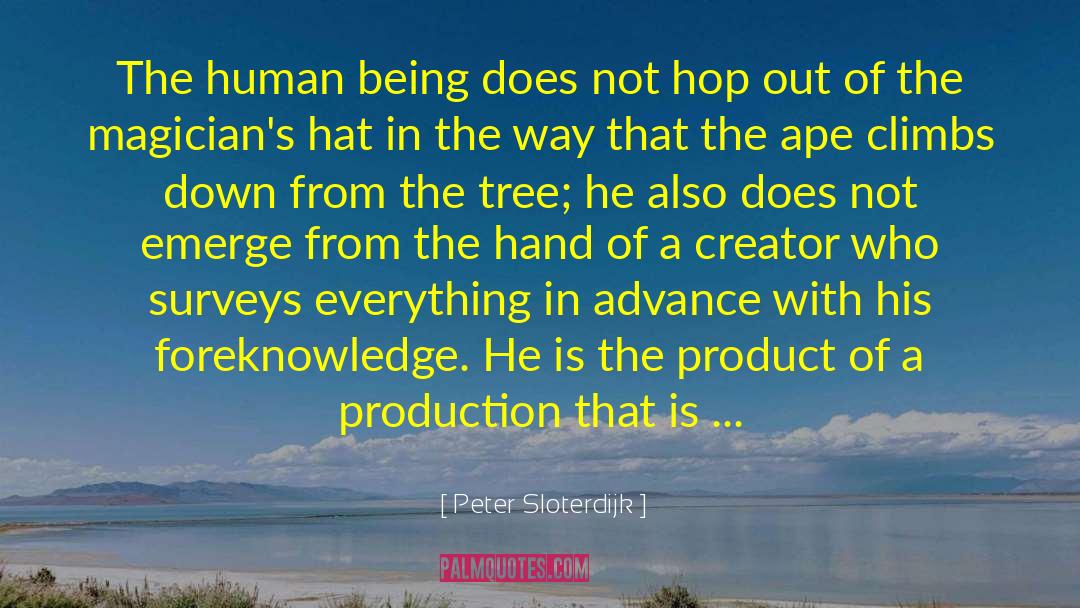
I receive the reward for my willingness to participate in the object-subject reversal in the form of a private illumination - in the present case, as an aesthetic movedness. The torso, which has no place that does not see me, likewise does not impose itself - it exposes itself. It exposes itself by testing whether I will recognize it as a seer. Acknowledging it as a seer essentially means 'believing' in it, where believing, as noted above, refers to the inner operations that are necessary to conceive of the vital principle in the stone as a sender of discrete addressed energies. If I somehow succeed in this, I am also able to take the glow of subjectivity away from the stone. I tentatively accept the way it stands there in exemplary radiance, and receive the starlike eruption of its surplus of authority and soul.
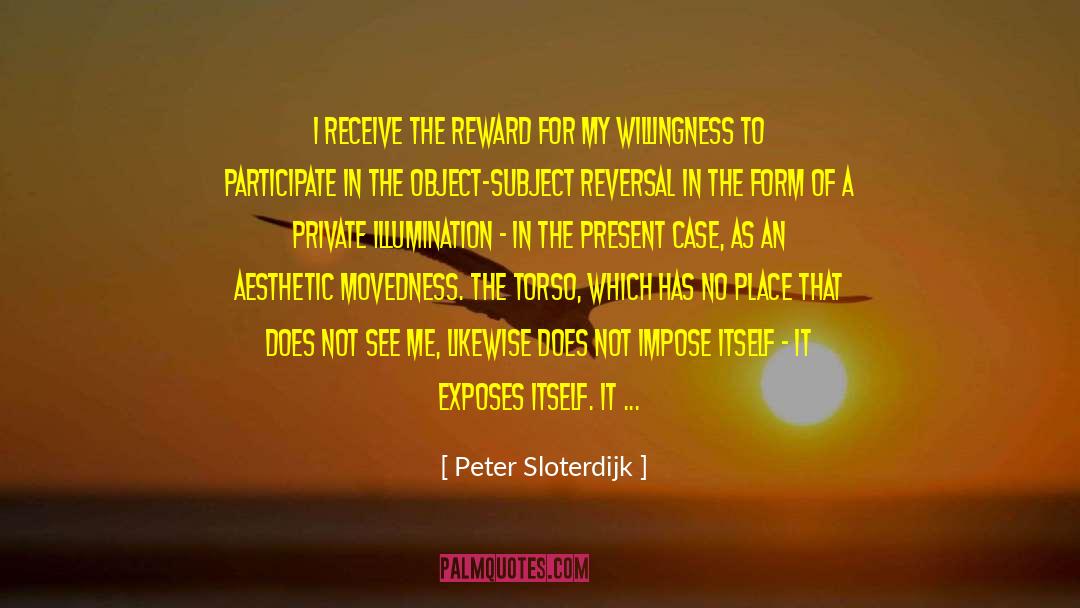
Fatally, the term 'barbarian' is the password that opens up the archives of the twentieth century. It refers to the despiser of achievement, the vandal, the status denier, the iconoclast, who refuses to acknowledge any ranking rules or hierarchy. Whoever wishes to understand the twentieth century must always keep the barbaric factor in view. Precisely in more recent modernity, it was and still is typical to allow an alliance between barbarism and success before a large audience, initially more in the form of insensitive imperialism, and today in the costumes of that invasive vulgarity which advances into virtually all areas through the vehicle of popular culture. That the barbaric position in twentieth-century Europe was even considered the way forward among the purveyors of high culture for a time, extending to a messianism of uneducatedness, indeed the utopia of a new beginning on the clean slate of ignorance, illustrates the extent of the civilizatory crisis this continent has gone through in the last century and a half - including the cultural revolution downwards, which runs through the twentieth century in our climes and casts its shadow ahead onto the twenty-first.
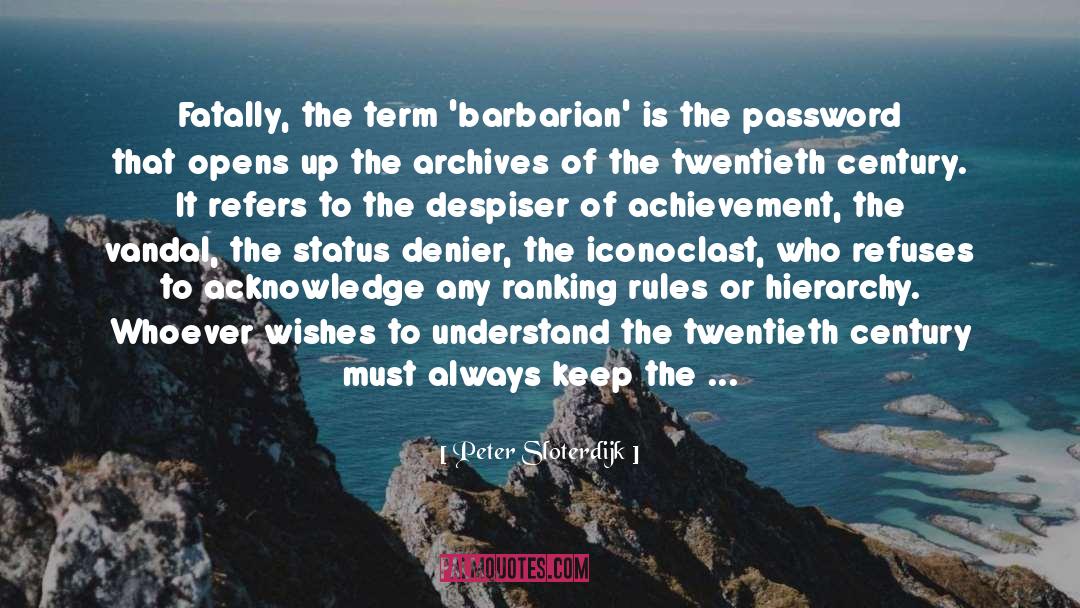
The notion that property is the means to all other means was ruled out by the new radicals. The deep seated ressentiment towards private property, indeed towards anything private, blocked the conclusion that follows from any impartial examination of wealth-producing and freedom-favouring mechanisms: an effective world improvement would call for the most general possible propertization. Instead, the political metanoeticians enthused over general dispossession, akin to the founders of Christian orders who wanted to own everything communally and nothing individually. The most important insight into the dynamics of economic modernization remained inaccessible to them: money created by lending on property is the universal means of world improvement. They are all the blinder to the fact that for the meantime, only the modern tax state, the anonymous hyper-billionaire, can act as a general world-improver, naturally in alliance with the local meliorists - not only because of its traditional school power, but most of all thanks to its redistributive power, which took on unbelievable proportions in the course of the twentieth century. The current tax state, for its part, can only survive as long as it is based on a property economy whose actors put up no resistance when half of their total product is taken away, year after year, by the very visible hand of the national treasury for the sake of communal tasks. What the un-calm understands least of all is the simple fact that when govern
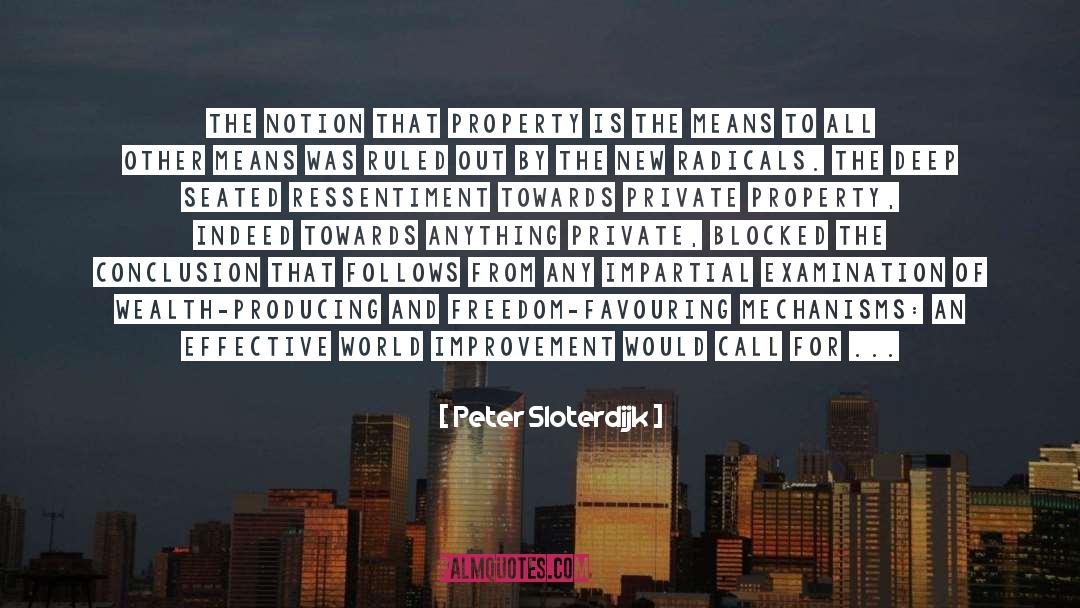
We can trace the communitarian fantasy that lies at the root of all humanism back to the model of a literary society, in which participation through reading the canon reveals a common love of inspiring messages. At the heart of humanism so understood we discover a cult or club fantasy: the dream of the portentous solidarity of those who have been chosen to be allowed to read. In the ancient world - indeed, until the dawn of the modern nation-states - the power of reading actually did mean something like membership of a secret elite; linguistic knowledge once counted in many places as the provenance of sorcery. In Middle English the word 'glamour' developed out of the word 'grammar'. The person who could read would be thought easily capable of other impossibilities.
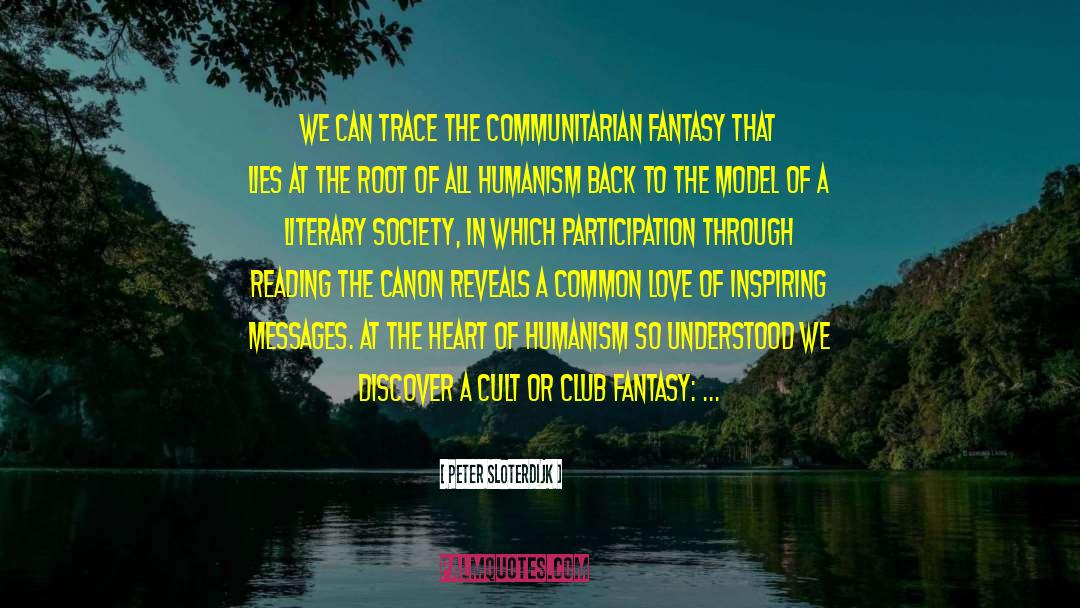
Being-'subject' means taking up a position from which an actor can make the transition from theory to practice. This transition usually takes place once an actor has found the motive that liberates them from hesitation and disinhibits them for action.
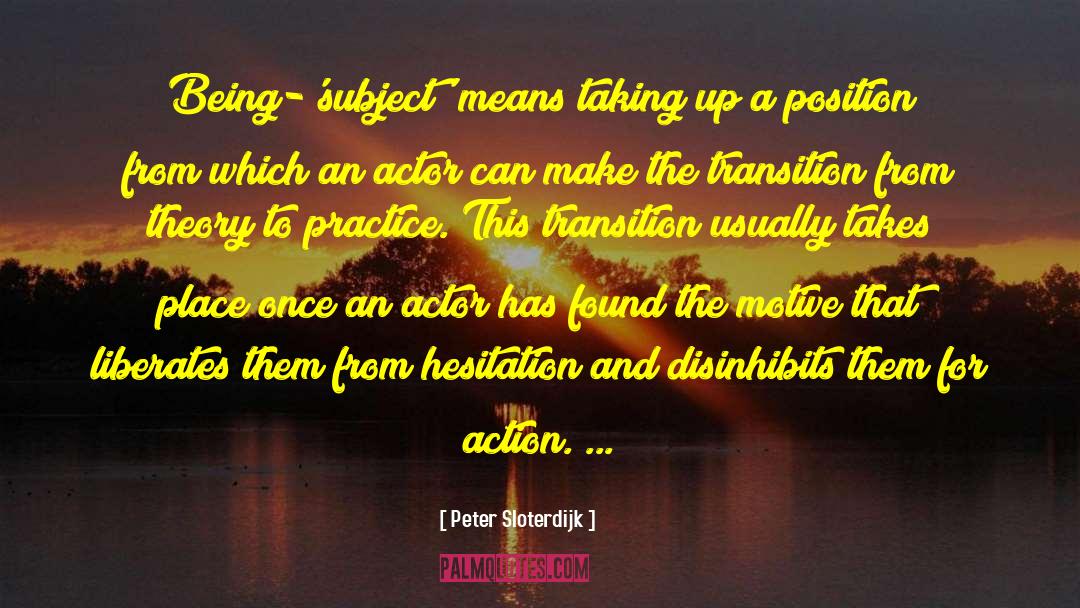
How much truth is contained in something can be best determined by making it thoroughly laughable and then watching to see how much joking around it can take. For truth is a matter that can withstand mockery, that is freshened by any ironic gesture directed at it. Whatever cannot withstand satire is false.
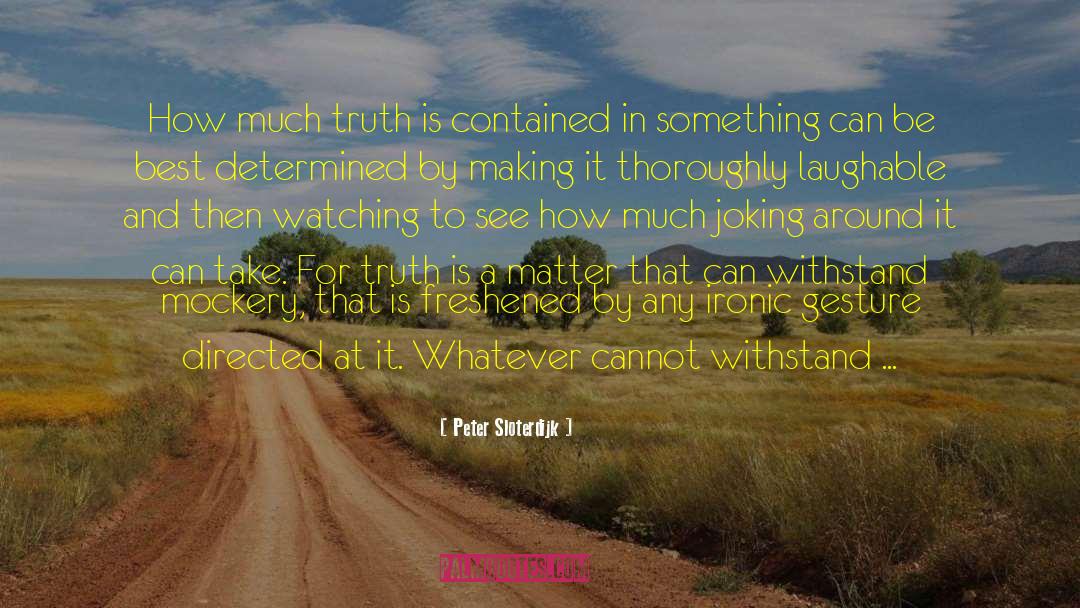
Gardens are enclosed areas in which plants and arts meet. They form 'cultures' in an uncompromised sense of the word.
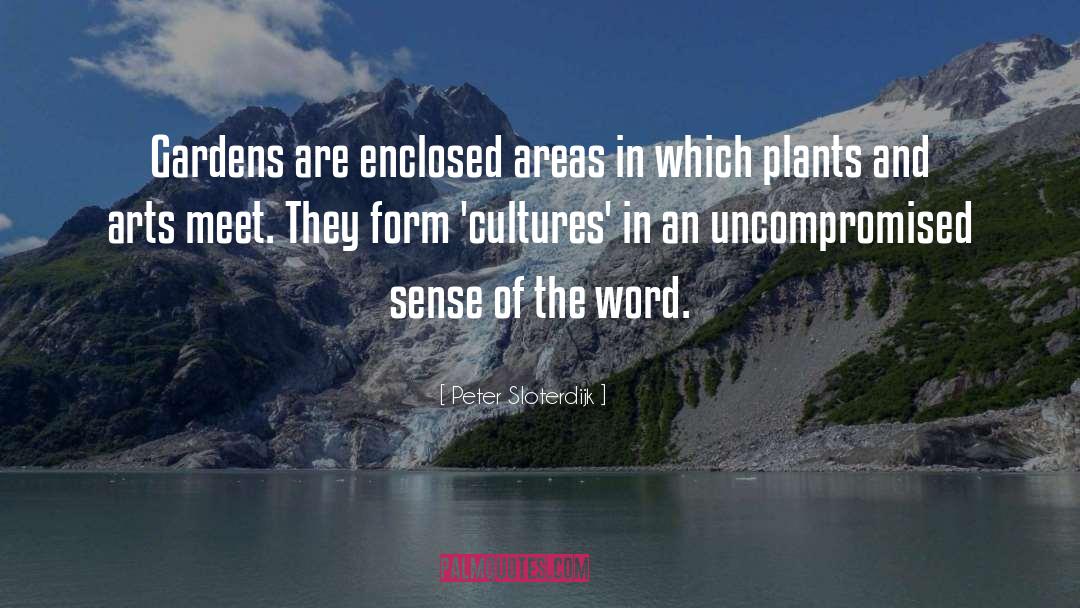
We know from accounts of Rilke's life that his stay in Rodin's workshops taught him how modern sculpture had advanced to the genre of the autonomous torso. The poet's view of the mutilated body thus has nothing to do with the previous century's Romanticism of fragments and ruins; it is part of the breakthrough in modern art to the concept of the object that states itself with authority and the body that publicizes itself with authorization.
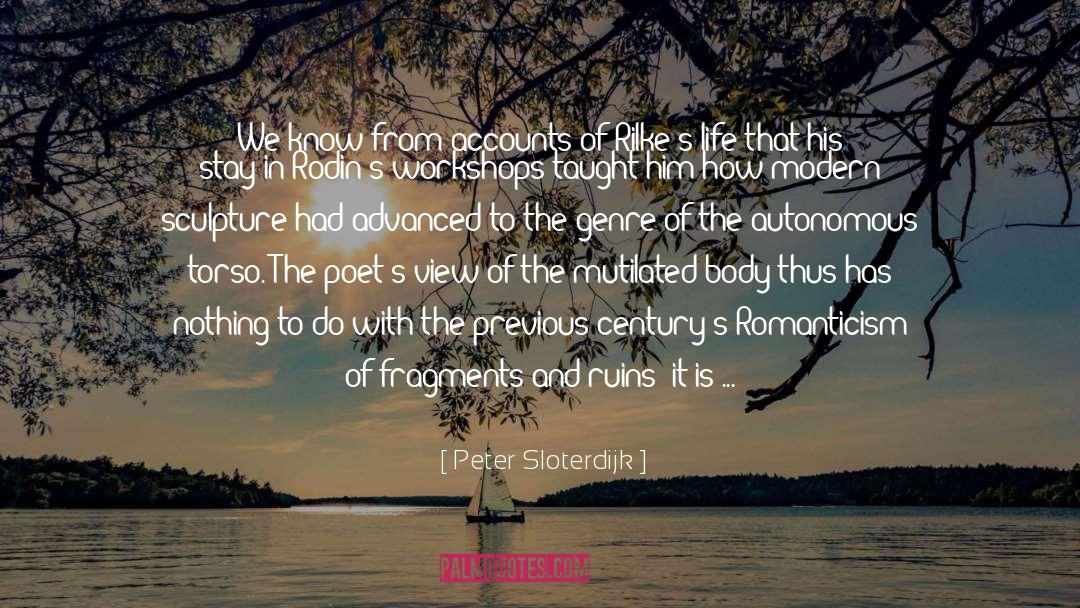
In truth, philosophy is the mode of thought shaped by the most radical form of prejudice: the passion of being-in-the-world. With the sole exception of specialists in the field, virtually everyone senses that anything which offers less than this passion play remains philosophically trivial. Cultural anthropologists suggest the appealing term 'deep play' for the comprehensively absorbing preoccupations of human beings. From the perspective of a theory of the practising life we would add: the deep plays are those which are moved by the heights.
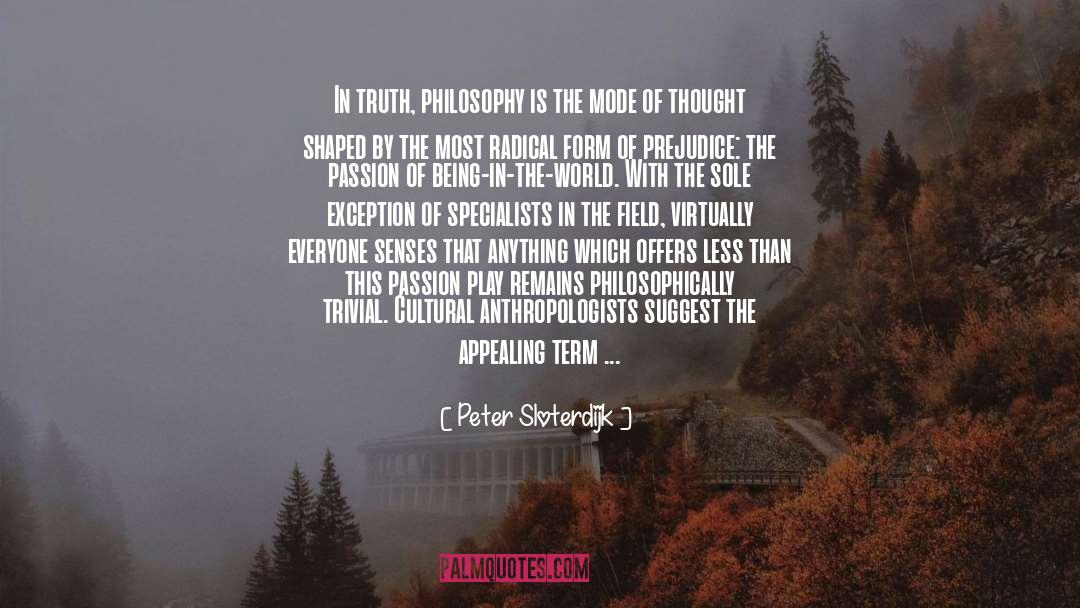
His concept of allochrony - initially introduced shyly as 'untimeliness', then later radicalized to an exit from modernity - is based on the idea, as suggestive as it is fantastic, that antiquity has no need of repetitions enacted in subsequent periods, because it 'essentially' returns constantly on its own strength. In other words, antiquity - or the ancient - is not an overcome phase of cultural development that is only represented in the collective memory and can be summoned by the wilfulness of education. It is rather a kind of constant present - a depth time, a nature time, a time of being - that continues underneath the theatre of memory and innovation that occupies cultural time.
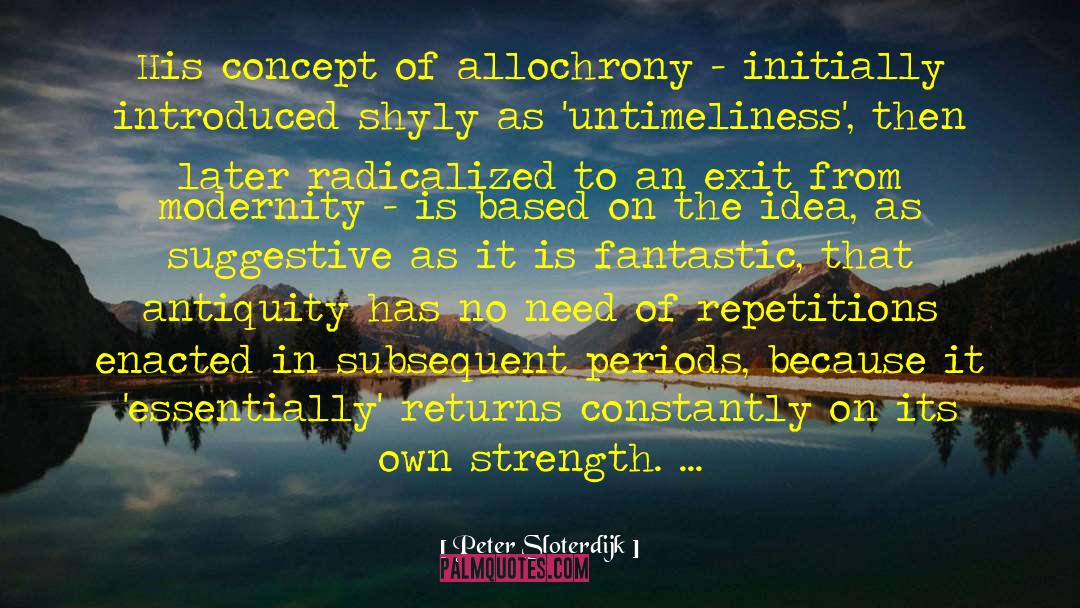
The de-spiritualization of asceticisms is probably the event in the current intellectual history of mankind that is the most comprehensive and, because of its large scale, the hardest to perceive, yet at once the most palpable and atmospherically powerful. Its counterpart is the informalization of spirituality - accompanied by its commercialization in the corresponding subcultures. The threshold values for these two tendencies provide the intellectual landmarks for the twentieth century: the first tendency is represented by sport, which has become a metaphor for achievement as such, and the second by popular music, that devotio postmoderna which covers the lives of contemporary individuals with unpredictable flashes of inner emergency.
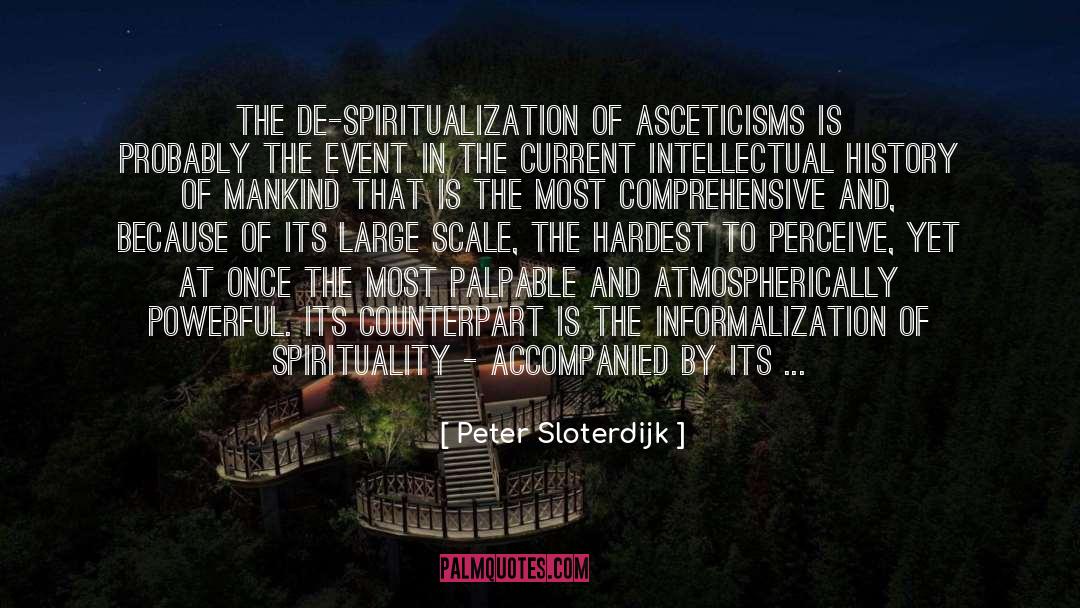
From the perspective of the radicals, the habitus basis of human existence is, as a whole, no more than a spiritually worthless puppet theatre into which a free ego-soul must be implanted after the fact, and through the greatest effort. If this fails, one experiences an effect in most people that is familiar from many athletes and models: they make a promising visual impression - but if one knocks, no one is at home. According to these doctrines, the adept can only rid themselves of their baggage by subjecting their life to a rigorous practice regime by which they can de-automize their behaviour in all important dimensions. At the same time, they must re-automatize their newly acquired behaviour so that what they want to be or represent becomes second nature.
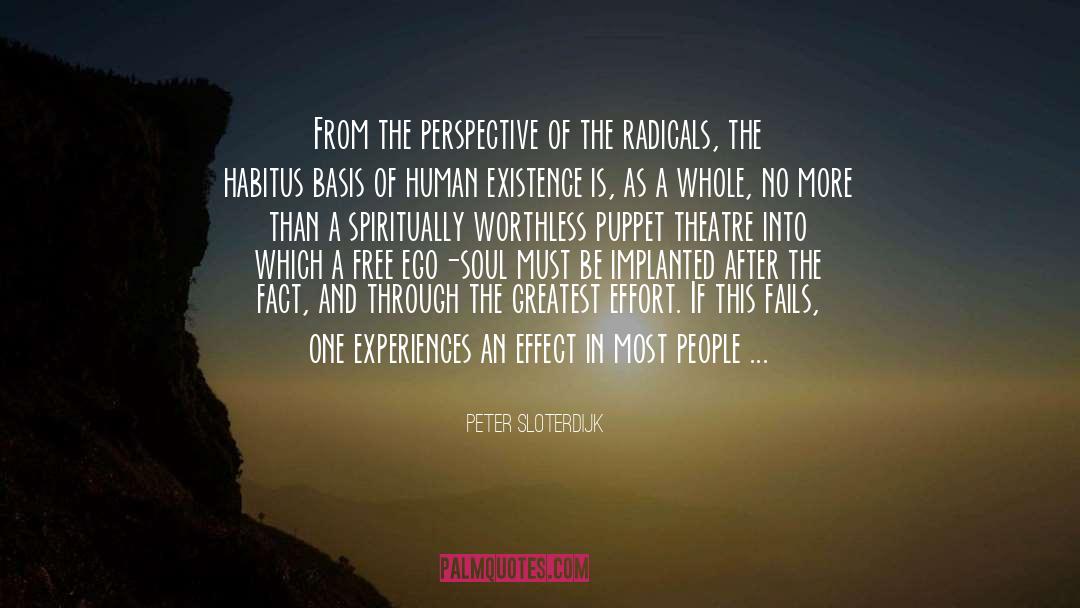
As long as no more than a small minority are capable of reading and writing, universal alphabetization seems like a messianic project. Only once everyone has this ability does one notice the catastrophe that almost no one can do it properly.
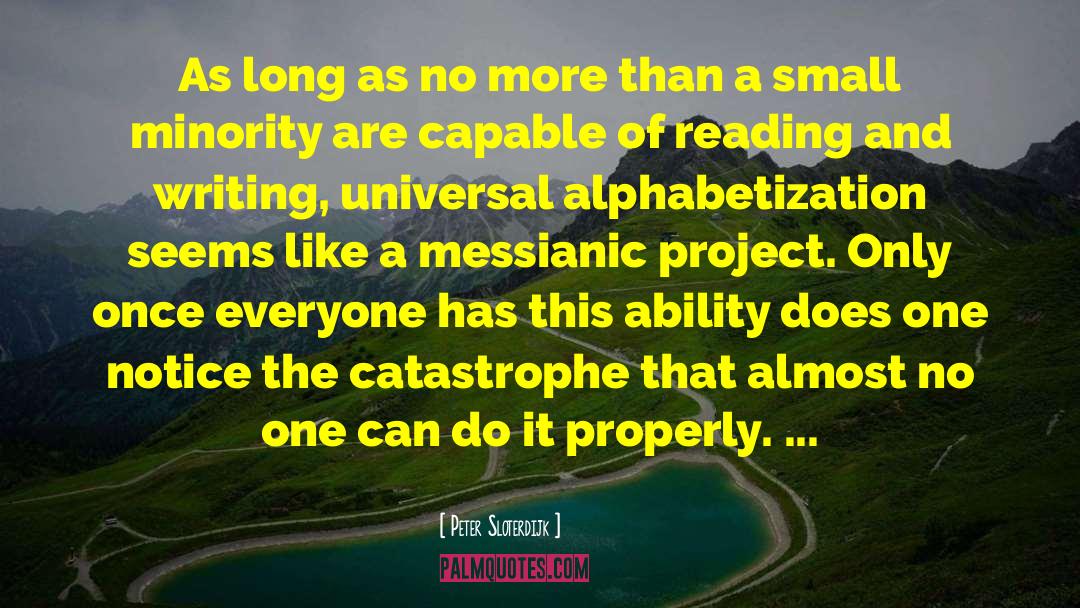
The history of the own that is grasped on too small a scale and the foreign that is treated too badly reaches an end at the moment when a global co-immunity structure is born, with a respectful inclusion of individual cultures, particular interests and local solidarities. This structure would take on planetary dimensions at the moment when the earth spanned by networks and built over by foams, was conceived as the own, and the previously dominant exploitative excess as the foreign. With this turn, the concretely universal would become operational. The helpless whole is transformed into a unity capable of being protected. A romanticism of brotherliness is replaced by a cooperative logic. Humanity becomes a political concept. Its members are no longer travellers on the ship of fools that is abstract universalism, but workers on the consistently concrete and discrete project of a global immune design. Although communism was a conglomeration of a few correct ideas and many wrong ones, its reasonable part - the understanding that shared life interests of the highest order can only be realized within a horizon of universal co-operative asceticisms - will have to assert itself anew sooner or later. It presses for a macrostructure of global immunizations : co-immunism.
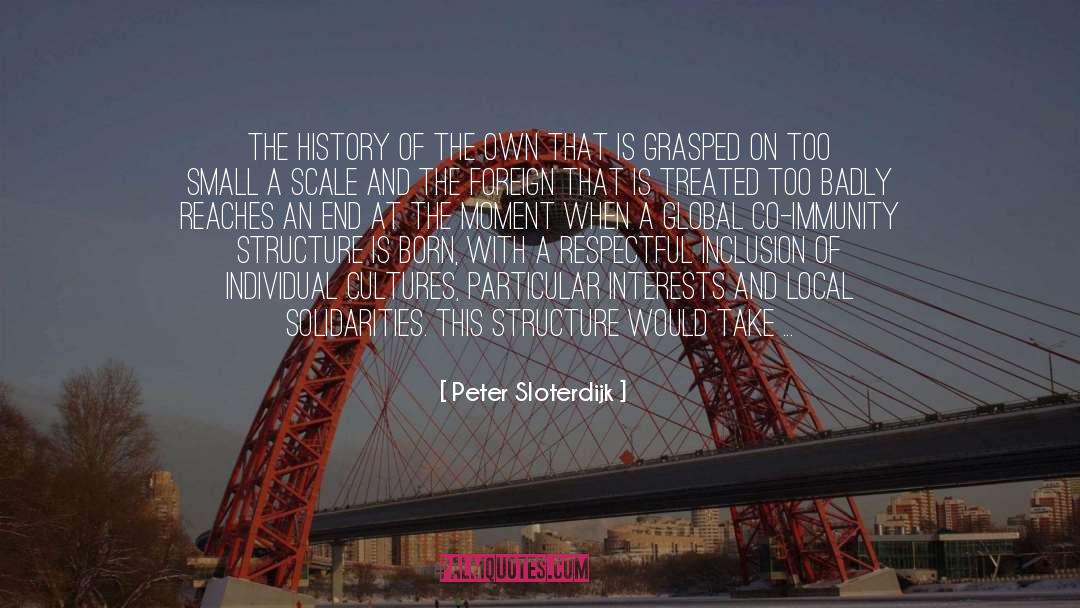
Something is indeed returning today - but the conventional wisdom that this is religion making its reappearance is insufficient to satisfy critical inquiries. Nor is it the return of a factor that had vanished, but, rather a shift of emphasis in a continuum that was never interrupted. The genuinely recurring element that would merit our full intellectual attention is more anthropological than 'religious' in its implications - it is, in a nutshell, the recognition of the immunitary constitution of human beings.
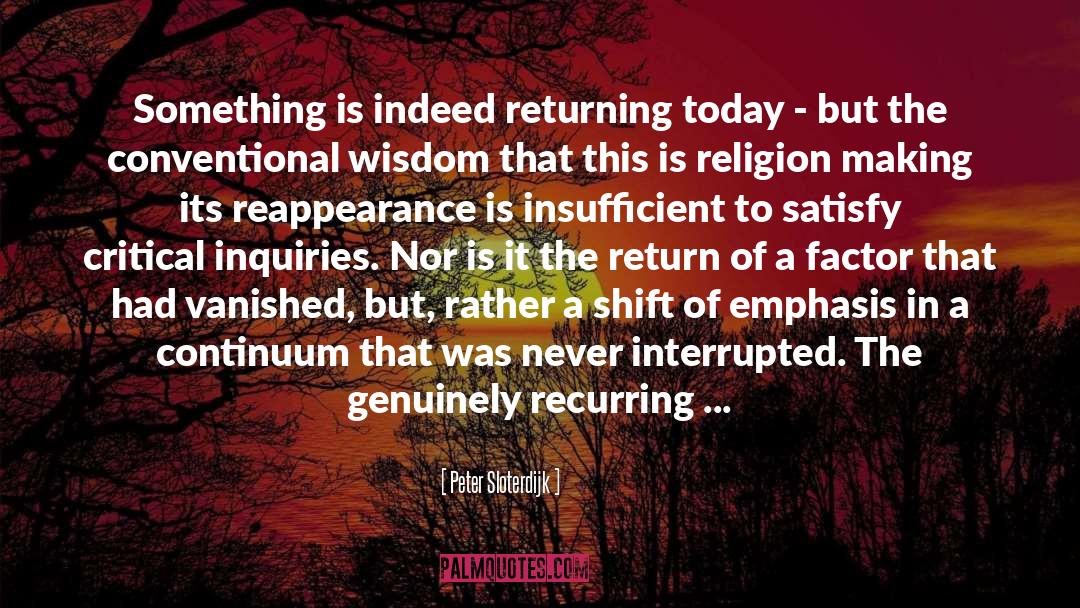
In his differentiation between asceticisms, Nietzsche posited a clear divide between the priestly varieties on the one side, illuminated by his vicious gaze, and the disciplinary rules of intellectual workers, philosophers and artists as well as the exercises of warriors and athletes on the other side. If the former are concerned with what one might call a pathogogical asceticism - an artful self-violation among an elite of sufferers that empowers them to lead other sufferers and induce the healthy to become co-sick - the latter only impose their regulations on themselves because they see them as a means of reaching their optimum as thinkers and creators of works.
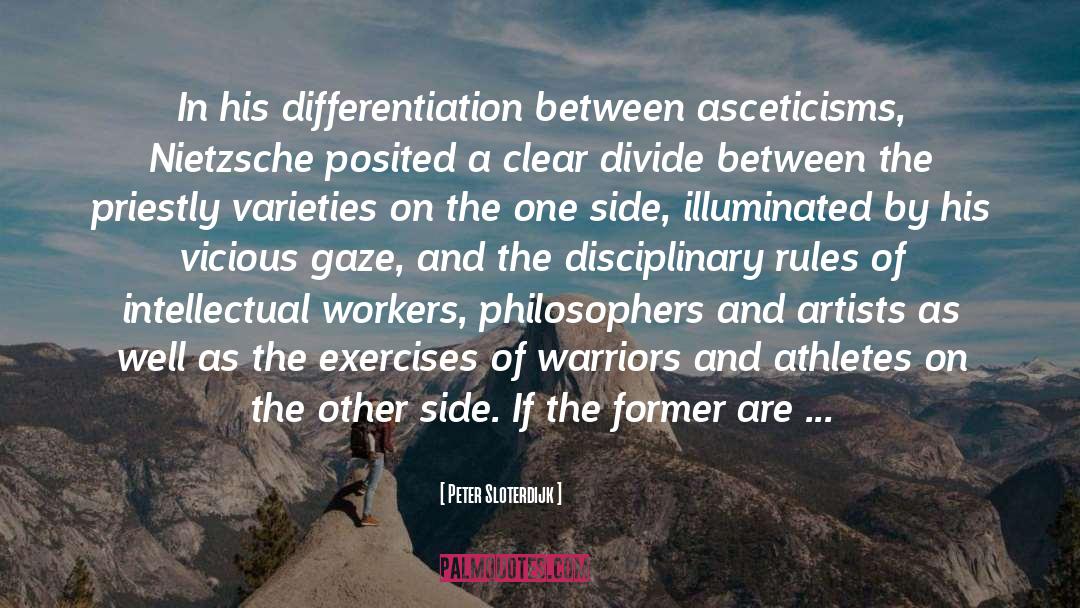
There is no 'eugenics' in Nietzsche - despite occasional references to 'breeding'- at least no more than is implicit in the recommendation to choose a partner under decent lightning conditions and with one's self-respect intact. Everything else falls under training, discipline, education and self-design - the Übermensch implies not a biological but an artistic, not to say an acrobatic programme. The only thought-provoking aspect of the marriage recommendation quoted above is the difference between onward and upward propagation. This coincides with a critique of mere repetition - obviously it will no longer suffice in future for children, as one says, to 'return' in their children. There may be a right to imperfection, but not to triviality.
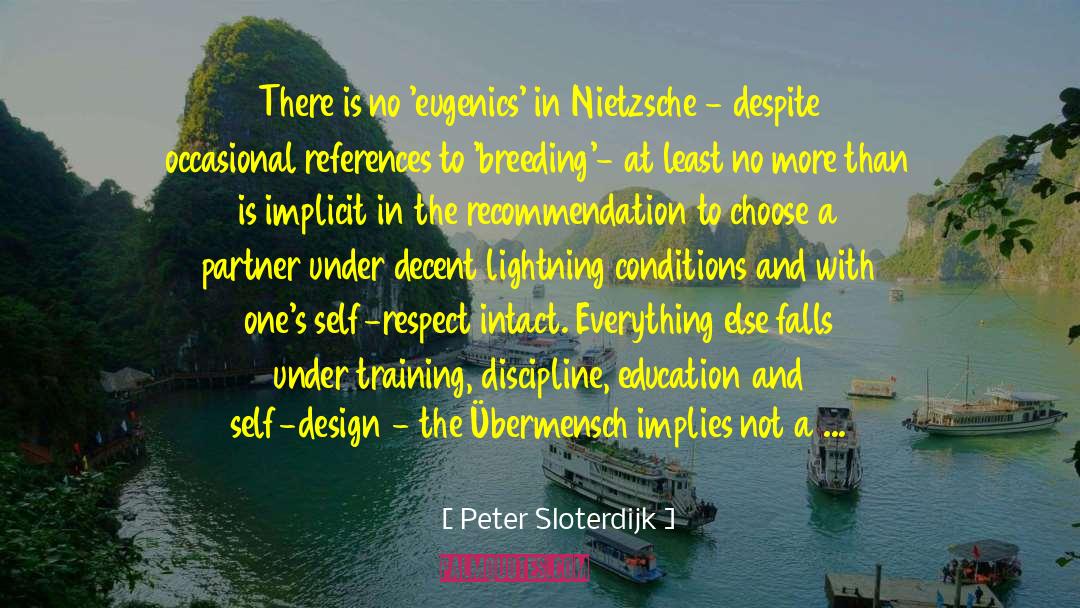
Mysticism is the acquired immunodeficiency of regional ontologies; one catches it through unprotected thought intercourse with the stirred-up concept of the infinite.
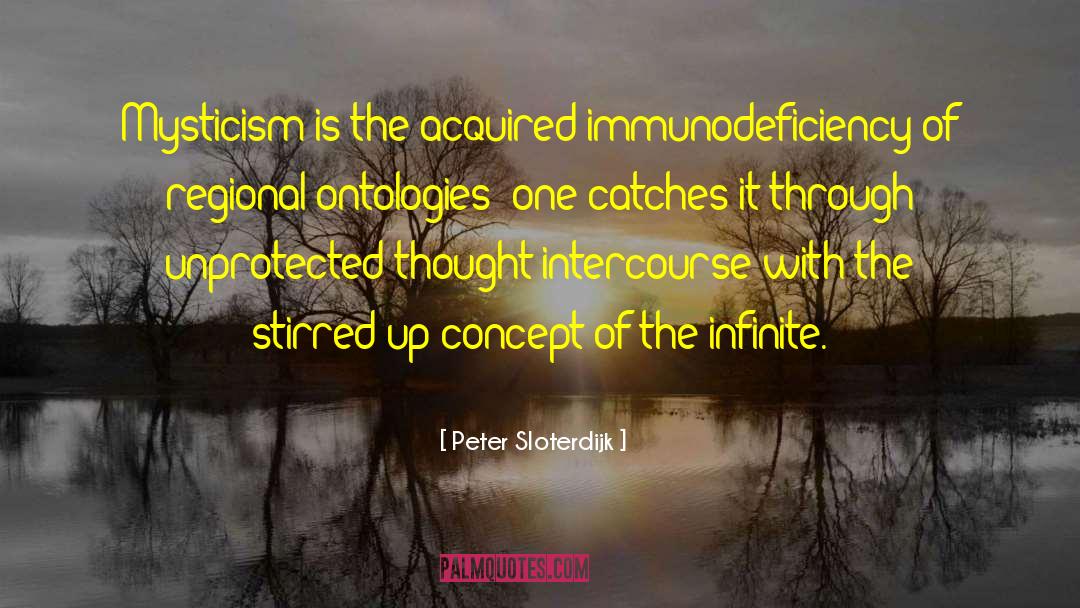
Let me repeat: the stakes are high. We must confront one of the most massive pseudo-evidences in recent intellectual history: the belief, rampant in Europe since only two or three centuries ago, in the existence of 'religions' - and more than that, against the unverified faith in the existence of faith. Faith in the existence of 'religion' is the element that unites believers and non-believers, in the present as much as in the past. It displays a single-mindedness that would make any prefect of the Congregation for the Doctrine of the Faith in Rome green with envy. No one who overcame religion ever doubted its existence, even if they opposed every single one of its dogmas. No denial ever confronted the denier with the question of whether its name was justified, and whether it had any lasting value in such a form. It is only because society has grown accustomed to a comparatively recent fiction - it did not come into use until the seventeenth century - that one can speak today of a 'return of religion'.' It is the unbroken faith in religion as a constant and universal factor which can vanish and return that forms the foundation of the current legend.
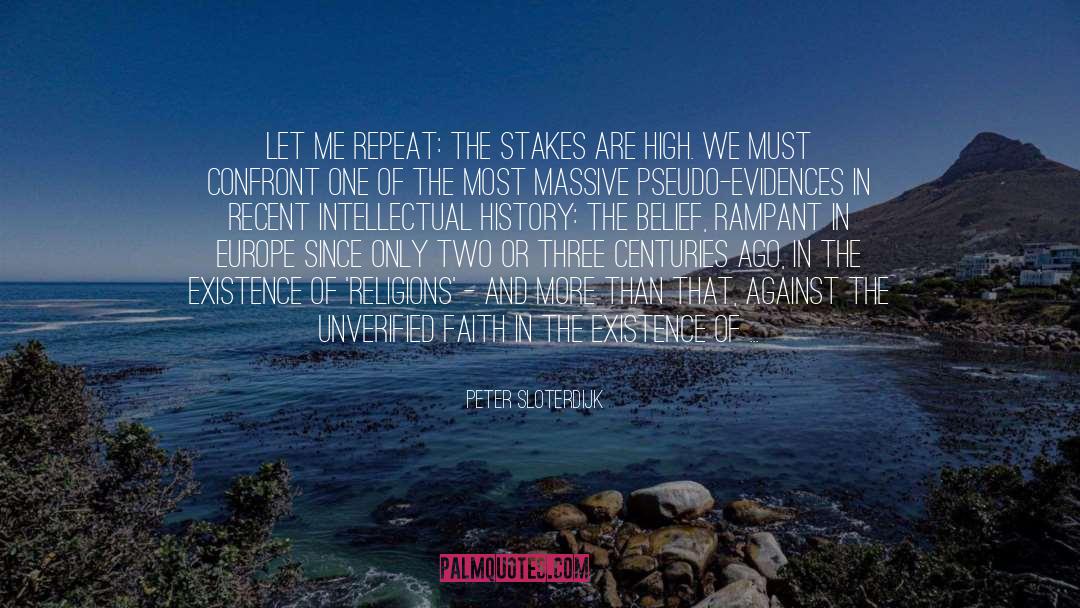
This gesture is one of the motifs of modernity's turn against the principle of imitating nature, that is to say, imitating predefined morphological expectations. It is still capable of perceiving message-totalities and autonomous thing-signals when no morphologically intact figures are left - indeed, precisely then. The sense for perfection withdraws from the forms of nature - probably because nature itself is in the process of losing its ontological authority. The popularization of photography also increasingly devalues the standard views of things. As the first edition of the visible, nature comes into discredit. It can no longer assert its authority as the sender of binding messages - for reasons that ultimately come from its disenchantment through being scientifically explored and technically outdone. After this shift, 'being perfect' takes on an altered meaning: it means having something to say that is more meaningful than the chatter of conventional totalities. Now the torsos and their ilk have their turn: the hour of those forms that do not remind us of anything has come. Fragments, cripples and hybrids formulate something that cannot be conveyed by the common whole forms and happy integrities; intensity beats standard perfection.
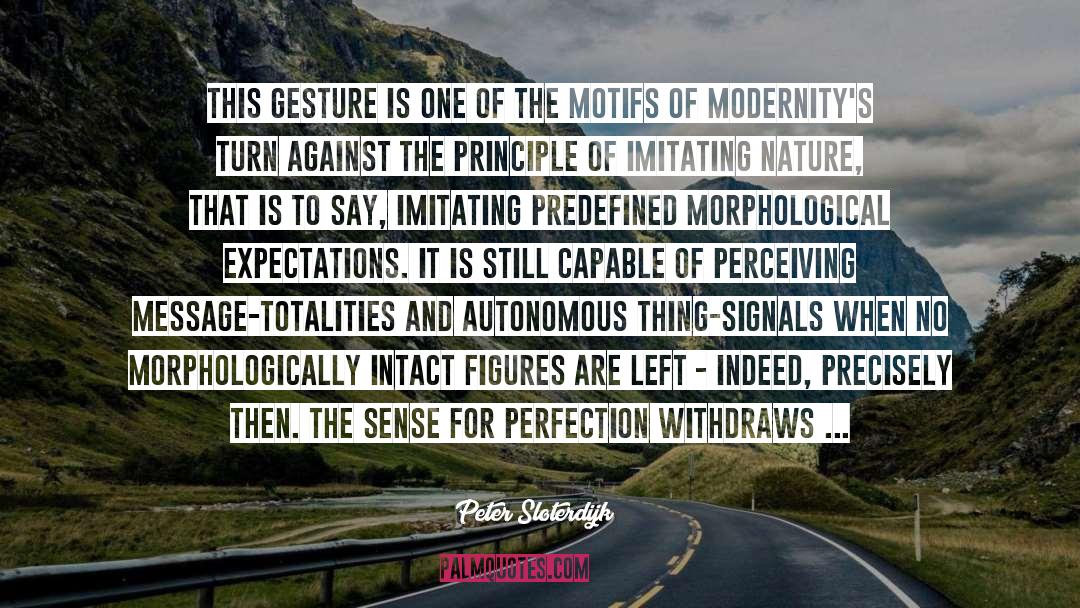
What early Christianity meant by 'faith' (pistis) was initially nothing other than running ahead and clinging to a model or idea whose attainability was still uncertain. Faith is purely anticipatory, in the sense that it already has an effect when it mobilizes the existence of the anticipatory towards the goal through anticipation. In analogy for the placebo effect, one would have to call this the movebo effect.
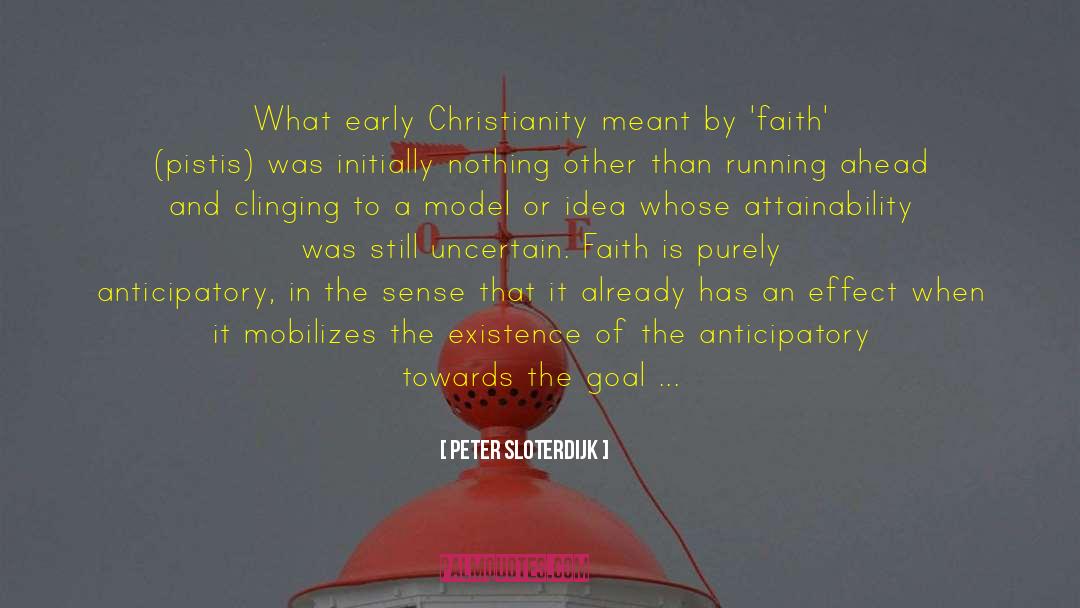
[Nietzsche's] questions - transcend, but where to; ascend, but to what height? - would have answered themselves if he had calmly kept both feet on the ascetic ground. He was too sick to follow his most important insight: that the main thing in life is to take the minor things seriously. When minor things grow stronger, the danger posed by the main thing is contained; then climbing higher in the minor things means advancing in the main thing.
![Peter Sloterdijk Quotes: [Nietzsche's] questions - transcend, but Peter Sloterdijk Quotes: [Nietzsche's] questions - transcend, but](https://palmquotes.com/author/peter-sloterdijk-quotes-1391259.jpg)
The hero of the following account, Homo immunologicus, who must give his life, with all its dangers and surfeits, a symbolic framework, is the human being that struggles with itself in concern for its form. We will characterize it more closely as the ethical human being, or rather Homo repetitious, Homo artista, the human in training. None of the circulating theories of behaviour or action is capable of grasping the practising human - on the contrary: we will understand why previous theories had to make it vanish systematically, regardless of whether they divided the field of observation into work and interaction, processes and communications, or active and contemplative life. With a concept of practice based on a broad anthropological foundation, we finally have the right instrument to overcome the gap, supposedly unbridgeable by methodological means, between biological and cultural phenomena of immunity - that is, between natural processes on the one hand and actions on the other.
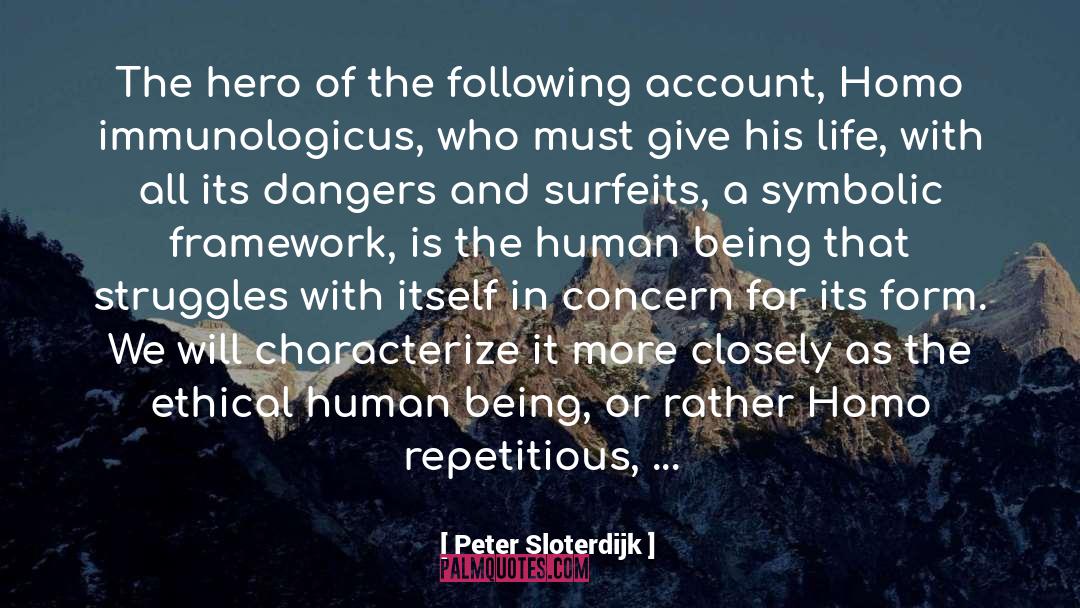
Viewed in this light, life itself appears as a dynamics of integration that is equipped with auto-therapeutic or 'endo-clinical' competencies and refers to a species-specific space of surprise. It has an equally innate and - in higher organisms - adaptively acquired responsibility for the injuries and invasions it regularly encounters in its permanently allocated environment or conquered surroundings. Such immune systems could equally be described as organismic early forms of a feeling for transcendence: thanks to the efficiency of these devices, which are constantly at the ready, the organism actively confronts the potential bringers of its death, opposing them with its endogenous capacity to overcome the lethal. Such functions have earned immune systems of this type comparisons to a 'body police' or border patrol. But as the concern, already at this level, is to work out a modus vivendi with foreign and invisible powers - and, in so far as these can bring death, 'higher' and 'supernatural' ones - this is a preliminary stage to the behaviour one is accustomed to terming religious or spiritual in human contexts. For every organism, its environment is its transcendence, and the more abstract and unknown the danger from that environment, the more transcendent it appears.

Via the mediation of the Enlightenment, this movement had changed from a hobby among a tiny literate elite and their secretaries, an ostentatious amusement among princely and mercantile art patrons and their masterly suppliers (who established a first 'art system'), into a national, a European, indeed a planetary matter. In order to spread from the few to the many, the renaissance had to discard its humanistic exterior and reveal itself as the return of ancient mass culture. The true renaissance question, reformulated in the terminology of practical philosophy - namely, whether other forms of life are possible and permissible for us alongside and after Christianity, especially ones whose patterns are derived from Greek and Roman (perhaps even Egyptian or Indian) antiquity - was no longer a secret discourse or an academic exercise in the nineteenth century, but rather an epochal passion, an inescapable pro nobis.
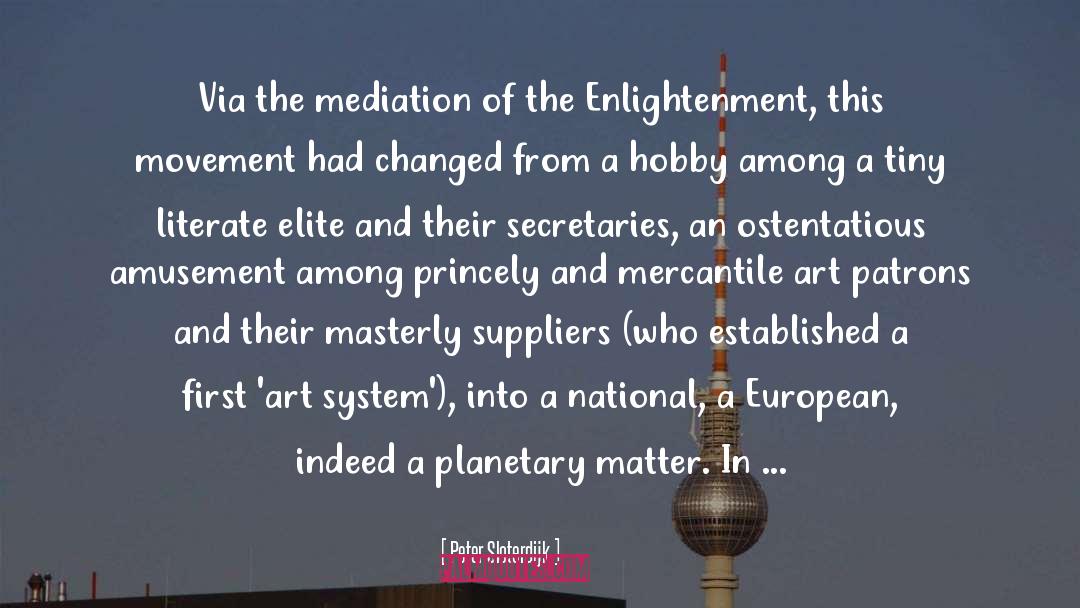
If Enlightenment in a technical sense is the programmatic word for progress in the awareness of explicitness, one can say without fear of grand formulas that rendering the implicit explicit is the cognitive form of fate. Were this not the case, one would never have had cause to believe that later knowledge would necessarily be better knowledge - for, as we know, everything that has been termed 'research' in the last centuries has rested on this assumption. Only when the inward-folded 'things' or facts are by their nature subject to a tendency to unfold themselves and become more comprehensible for us can one - provided the unfolding succeeds - speak of a true increase in knowledge. Only if the 'matters' are spontaneously prepared (or can be forced by imposed examination) to come to light in magnified and better-illuminated areas can one seriously - which here means with ontological emphasis - state that there is science in progress, there are real knowledge gains, there are expeditions in which we, the epistemically committed collective, advance to hidden continents of knowledge by making thematic what was previously unthematic, bringing to light what is yet unknown, and transforming vague cognizance into definite knowledge. In this manner we increase the cognitive capital of our society - the latter word without quotation marks in this case.
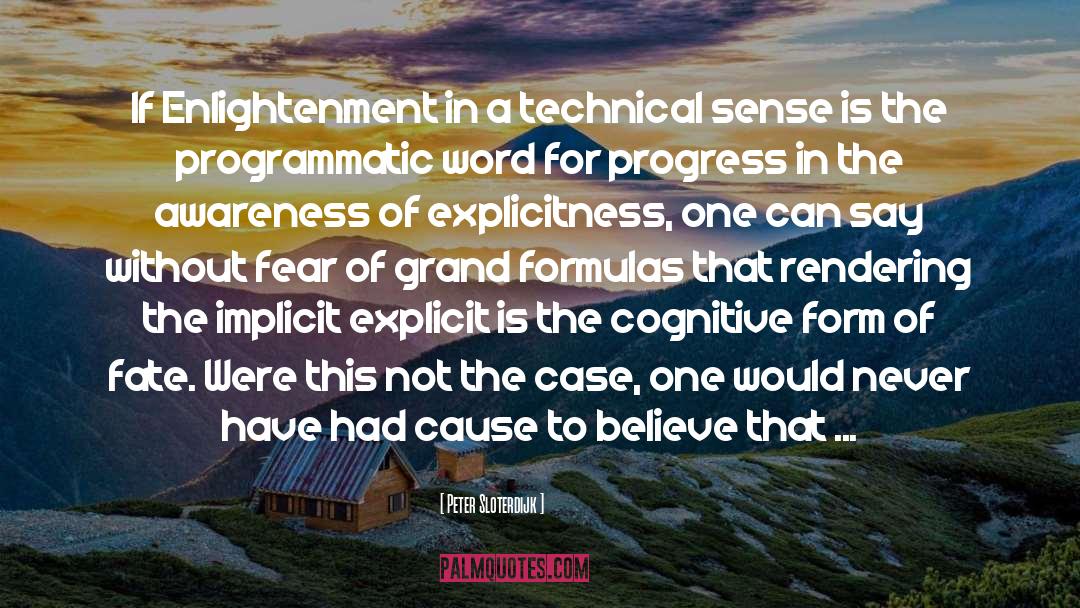
A philosopher is one who, as an athlete of totality, is laden with the weight of the world. The essence of philosophy as a form of living is philponia - friendship with the entirety of weighty and worth things. The love of wisdom and the love of the weight of the one whole are unified.
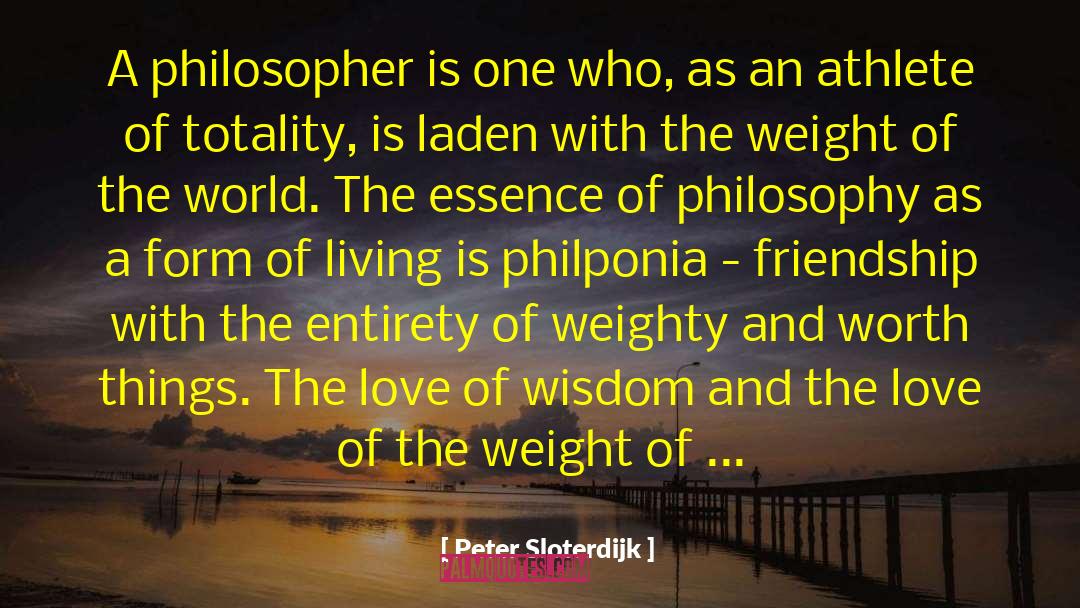
The Enlightenment, finally, invented progressive 'history' as an inner-worldly purgatory in order to develop the conditions of possibility of a perfected 'society'. This provided the required setting for the aggressive social theology of the Modern Age to drive out the political theology of the imperial eras. What was the Enlightenment in its deep structure if not an attempt to translate the ancient rhyme on learning and suffering - mathein pathein - into a collective and species-wide phenomenon? Was its aim not to persuade the many to expose themselves to transitional ordeals that would precede the great optimization of all things?

It is not sufficient, he emphasized, to colour (colorare) the mind with wisdom; it must be pickled (macerare) in it, as it were, soaked in it (inficere), and entirely transformed by it.
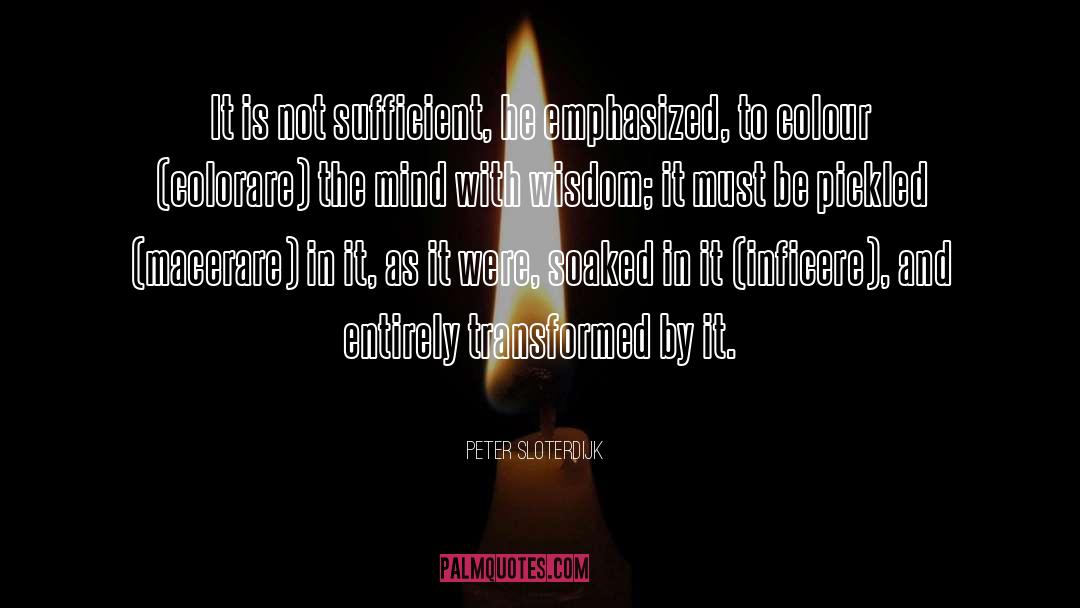
In his treatise on the battles between the gods underlying ancient Dionysian theatre, the young Nietzsche notes: 'Alas! The magic of these struggles is such, that he who sees them must also take part in them.' Similarly, an anthropology of the practising life is infected by its subject. Dealing with practices, asceticisms and exercises, whether or not they are declared as such, the theorist inevitably encounters his own inner constitution, beyond affirmation and denial.
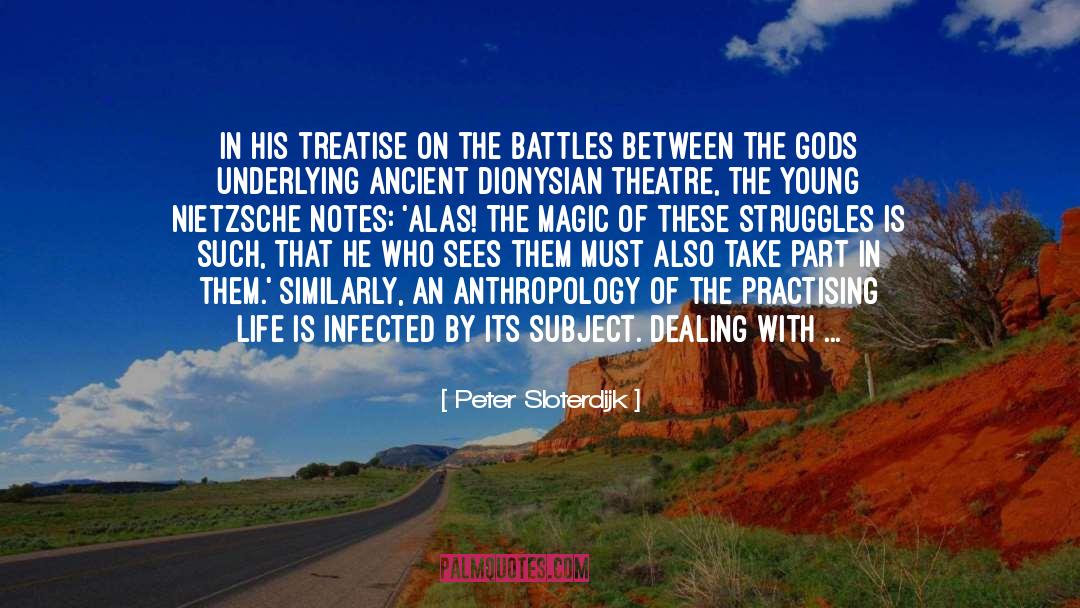
This background enables us to understand a fact that is symptomatic of the current phase of saturation: there are countless people who want to withdraw from the omnipresence of advertising, who even avoid it like the plague. Here too, it is helpful to distinguish between the states before and after. From the perspective of the burgeoning world of products, advertising could be justified by the argument that spreading the word about the existence of new means of life improvements was indispensable, as the populations of industrial and trading nations would otherwise have been cheated of major knowledge about discreet improvements to the world. As the ambassador of new bringers of advantage, early advertising was the general training medium for contemporary performance collectives thoughtlessly denounced in culture-conservative milieus as 'consumer societies'. The aversion to advertising that pervades the saturated infospheres of the present, however, is based on the correct intuition that, in most of its manifestations, it has long since become a form of downward training. It no longer passes on what people should know in order to access advantageous innovations; it creates illusions of purchasable self-elevations that de facto usually lead to weakenings.
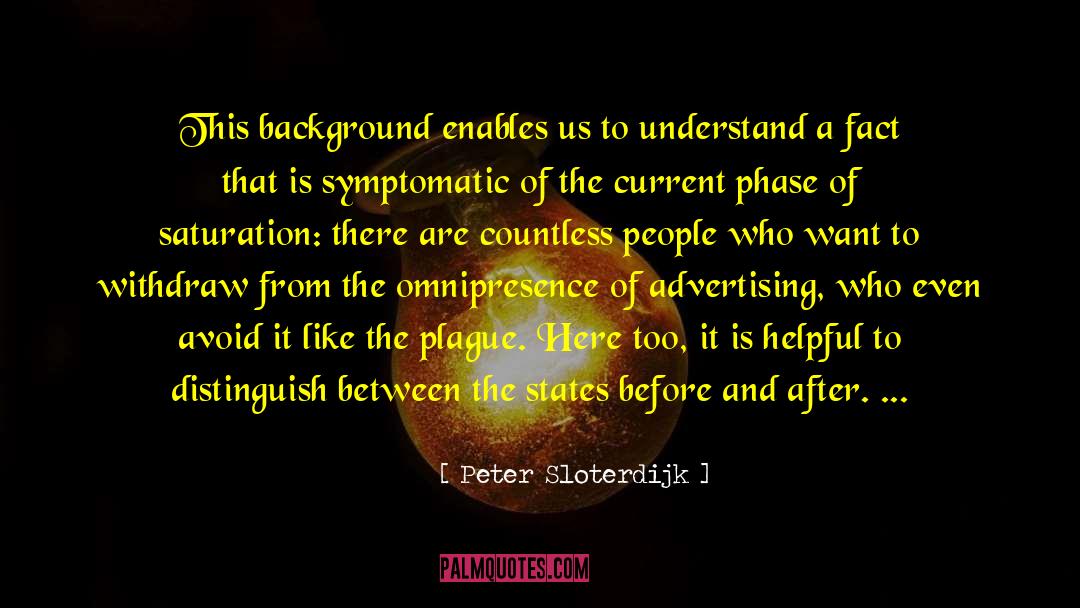
I am already living, but something is telling me with unchallengeable authority: you are not living properly. The numinous authority of form enjoys the prerogative of being able to tell me 'You must'.
It is the authority of a different life in this life. This authority touches on a subtle insufficiency within me that is older and freer than sin; it is my innermost not-yet. In my most conscious moment, I am affected by the absolute objection to my status quo: my change is the one thing that is necessary. If you do indeed subsequently change your life, what you are doing is no different from what you desire with your whole will as soon as you feel how a vertical tension that is valid for you unhinges your life.
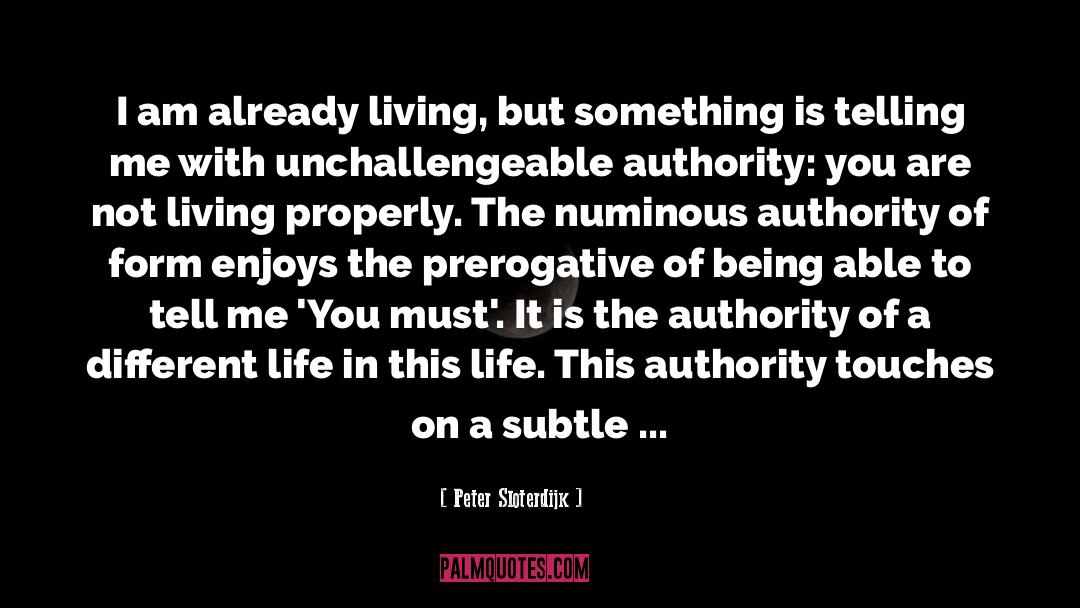
It is clear enough that not every something can be elevated to the rank of a thing - otherwise everything and everyone would be speaking once more, and the chatter would spread from humans to things. Rilke privileges two categories of 'entities' [Seienden), to express it in the papery diction of philosophy, that are eligible for the lofty task of acting as message-things - artifices and living creatures - with the latter gaining their particular quality from the former, as if animals were being's highest works of art before humans. Inherent to both is a message energy that does not activate itself, but requires the poet as a decoder and messenger.

The reason for the existence of the perfection conjured up in these fourteen lines is that it possesses ... the authorization to form a message that appeals from within itself. This power of appeal is exquisitely evident in the object evoked here. The perfect thing is that which articulates an entire principle of being. The poem has to perform no more and no less than to perceive the principle of being in the thing and adapt it to its own existence - with the aim of becoming a construct with an equal power to convey a message.
